#I think a lot of things with writing boil down to intention and the meaning behind a work
Note
was reading the "Fade into Dark" summary, and i was wondering. what's your definition of "romanticising" something detrimental like those topics?
Romanticizing, in my opinion, is writing a heavy subject in a tantalizing or gratuitous manner so that the appeal of it is the eroticism of the subject rather than the detrimental impact.
#I wrote a whole answer to this and it didn’t post sigh#trying again#does this make sense#it’s like writing rape scenes and framing them as sex scenes rather than violence#and even then what is the purpose of a rape scene other than to glorify rape? why would you give the rapist a power to be seen#I think the argument can ofc be made that fics like FiD are not as sensitive as I attempted for them to be#but I’ll give 17/18 yo Jess some leeway#I think a lot of things with writing boil down to intention and the meaning behind a work#and FiD isn’t about how luxurious street prostitution is. it’s about how horrible it is#pretty woman for example?? that romanticizes the hell out of hooking#and that’s just not the reality of these kinds of situations#so yeah hope that makes sense
2 notes
·
View notes
Note
Even if a creator is a bad person it's still okay to like their work. People need to mind their own business.
Honestly it's not really that sort of situation. I'll actively defend Steven Moffat here.
There was a huge hate movement for him back in the early 2010s - which, in retrospect, formed largely because he was running 2 of the superwholock shows at once, one of which went through extremely long hiatuses* and the other of which was functionally an adaptation of an already well regarded show**, making him subject to a sort of double ire in the eyes of a lot of fandom people. Notably, his co-showrunner, Mark Gatiss, is rarely mentioned and much of his work is still attributed to Moffat (and yes, this includes that Hbomberguy video. Several of "Steven Moffat's bad writing choices" were not actually written by him, they were Gatiss.)
People caricatured the dude into a sort of malicious, arrogant figure who hated women and was deliberately mismanaging these shows to spite fans, to the point where people who never watched them believe this via cultural osmosis. It became very common to take quotes from him out of context to make them look bad***, to cite him as an example of a showrunner who hated his fans, someone who sabotaged his own work just to get at said fans, someone who was too arrogant to take criticism, despite all of this being basically a collective "headcanon" about the guy formed on tumblr. Some if it got especially terrible, like lying about sexual assault (I don't mean people accused him of sexual assault and I think they're making it up, I mean people would say things like "many of his actresses have accused him of sexual assault on set" when no such accusations exist in the first place. This gets passed around en masse and is, in my opinion, absolutely rancid.)
On top of that a ton of the criticism directed at the shows themselves is, personally, just terrible media criticism. So much of it came from assuming a very hostile intent from the writer and just refusing to engage with the text at all past that.
Like some really common threads you see with critique of this writer's work, especially in regards to Doctor Who since that's the one I'm most familiar with:
A general belief that his lead characters were meant to be ever perfect self inserts, and so therefore when they act shitty or arrogant or flawed in any way, that's both reflective of the author and something the show wants you to view as positive or aspirational.
An overarching thesis that his characters are "too important" in the narrative due to the writer's arrogance and self obsession (even though this is a very deliberate theme that's stated several times)
A lot of focus on the writer personally "attacking" the fans or making choices primarily out of spite.
A tendency to treat the show being different to what it's adapting as inherently bad and hostile towards the original.
Just generally very little consideration and engagement with the themes, intent, etc. of the shows
This one's a little more nebulous and doesn't apply to all critique but a lot of it, especially recently, is clearly by people who haven't seen the show in like 10 years and their opinion is largely formed secondhand through like, "discourse nostalgia". Which. you know. bad.
I think these are just weird and nonsensical ways to engage with a work of fiction. I also think it's really sad to see the show boiled down to this because that era of who is, in my opinion, very thematically rich and unique among similar shows, and I'm disappointed that it's often dismissed in such a paltry way.
This isn't to say people aren't allowed to critique Steven Moffat or anything, but the context in which he basically became The Devil™ to a large portion of fandom and is still remembered in a poor light is very tied to this perfect storm of fan culture and I just don't agree with a ton of it.
* I'm sure most people have seen the way long running shows and hiatuses will cause people to fall out with a show, with some former fans turning around and joining a sort of "anti fandom" for it while it's still airing. That happened with both these shows.
** Doctor Who will change it's entire writing staff, crew, and cast every few years, and with that comes a change in style, tone, theme - the old show basically ends and is replaced by a new show under the same title. As Steven Moffat's era was the first of these handovers for the majority of audiences, you can imagine this wasn't a well loved move for many fans.
*** I know for a fact most people have not sought out the sources for a lot of these quotes to check that they read the same in context because 1) most of them were deleted years ago and are very difficult to find now and 2) many of them do actually make sense in the context of their respective interviews
#and yeah i think the hbomberguy video is kind of bad#I can pull up examples but a lot of what he's saying is very rooted in this sort of critique#maybe most egregiously he sometimes just explains something very poorly or outright incorrectly to make it seem worse or more nonsensical#ex. saying a scene in doctor who 'steals a huge chunk of the plot' when it's less than 30 seconds long#saying two characters randomly start hanging out again while not mentioning the episode entirely dedicated to this#or the way her decision to keep hanging out with him is the emotional turning point of the entire season#etc etc etc.
491 notes
·
View notes
Text
RE: Homestuck Discourse, Media Literacy, Fandom Entitlement, & The Puppet Theory
an essay by yours truly
content warning: discussions of child abuse, CSA, & child neglect
so many discourses and debates surrounding homestuck boil down to lacking basic media literacy. so instead of making a petulant rant, i’ll attempt writing a productive essay, but forgive me if my annoyance seeps into parts of this post due to the subject matter. let’s start with dave, since he’s one of the most contentious characters (also because he’s my blorbo, sorry not sorry), and move on from there!
i constantly see people say something along the lines of “davekat happening in the retcon timeline makes no sense why would terezi ignore dave and gamzee yada yada yada”, like there’s not a whole scene that explains this! and it’s one of the most plot relevant scenes in the comic!! if you don’t know what the blood scarf even is, your opinion on this irrelevant, since you didn’t read/remember the text. rule number one of media literacy is properly consuming the media.
“dave being abused and the gay stuff came out of nowhere” this is definitively not true. one of the first things we learn about dave is that he has to hide food in his room so he doesn’t starve, and that this is an intentional choice by his brother. oh, and then his brother actually beats the shit out of him on screen, while not letting him abscond, right after we see john and rose strife their parents in a healthy way no less. (take note of bro using cal, and dave trying to abscond from him. more on that later.)

and re: dave’s sexuality, rose immediately points out that dave is probably gay during their first on screen interaction, and it’s her first line of dialogue to him.
TT: In some cultures the persistent refusal of a lady's invitation to play a game with her would be a sign wanton disrespect.
TT: Either that, or flagrant homosexuality.
moving on, later that same day, dave outright admits he loves john:
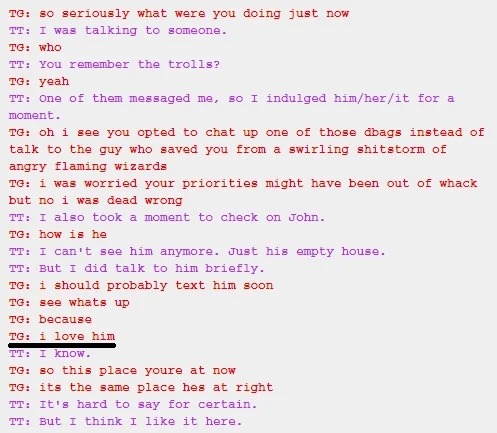
in these scenes, rose would be considered a mouthpiece! author’s use mouthpieces to get across information to the audience, that the character(s) themsel(ves) don’t know. in this case, that character is dave.
so now let’s address the elephant in the room, you probably thought these messages were just jokes, and that’s okay! that’s for three reasons:
first, your worldviews and perspectives shift the way you perceive the world, and more specifically art in this instance. that’s a fundamental part of the human experience. having your own personal biases based on your life experiences isn’t inherently a bad thing! for example, if you finish my essay, you can learn more about compulsive heterosexuality, or the effects of child abuse, see all of the signs, all without having to deal with it first hand. which is great! that’s the point of art and storytelling.
secondly, you probably still thought dave was straight while reading this narration. that’s because homestuck is written in deep pov, or as you would probably call it, unreliable narration. these are technically two separate things, but i don’t feel like breaking down all of those pedantics. all you need to know is: deep pov is when a character’s worldviews and perspective shift the narrative, rather than a story being told objectively. think junie b jones, the percy jackson series, or uh, catcher in the rye, if you’re into that sort of thing. that means that all the dialogue and narration within homestuck will always have some level of subtext, aka the non-literal explanation for text. homestuck is made by adults for adults, so it’s created on the basis we can analyze the text, and come to our own conclusions, unlike YA and children’s media.
a lot of people assume homestuck is supposed to be YA series, but that’s not the case. homestuck’s themes are about exploring the effects of child abuse and neglect, which you need to be an adult to fully understand. and unlike cinderella, homestuck shows child abuse on screen, and as we’ll discuss later, tackles subject matter about CSA, or child s*x*al *ss*lt. that inherently makes it a 18+ story, no matter the ages of any characters involved. just because most of us read homestuck as kids doesn’t really have any impact on that.
“well there’s no explicitly 18+ content in homestuck!!! they’re all 13!!!!” please take one look at equius’s room, or translate damara’s dialogue, and tell me if you still feel that way. oh, and read the epilogues too. also do you not remember the sheer amount of bloodshed, sex jokes, and cursing shown without a single censor??? even the official homestuck twitter said this:
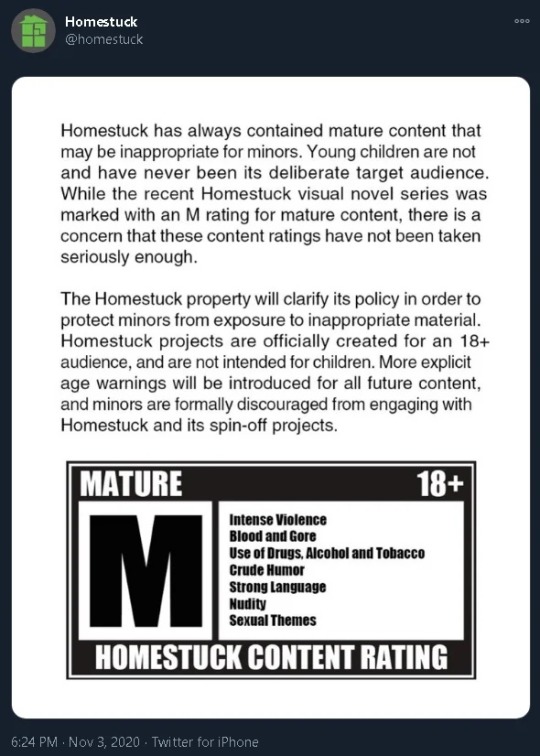
finally, it’s also worth mentioning the time homestuck was made, because art can’t be removed from it’s historical context. so in 2009, gay representation was still virtually non-existent, especially in children’s and teen media. in the 2000s there was an extremely prevalent trope, “queer people are funny”, where the whole joke is that a character doing something that could be perceived as gay, or transgender, is funny. this problem was especially rampant in media for men. the most infamous example of this is family guy this was s8e18 of family guy, “quagmire’s dad”, where the whole joke is that brian slept with a trans woman, and everyone single joke comes at the expense of the trans woman, who’s relegated to a background role, while the narrative focuses on quagmire and brian’s emotions, the two cis men. so what homestuck is doing is called a deconstruction of this trope! deconstruction is where you break something down to critically analyze the philosophy behind it. we’ll leave a pin in john for now (just you wait), but it’s made extremely clear that dave is struggling with internalized homophobia, thus deconstructing why he makes these jokes in the first place. by the end of homestuck, dave says:
DAVE: but ive had a fuck ton of time on my hands to think about stuff. about stuff ive said and done in the past why i said and did them. a lot of things i once would have insisted were like part of my brand and helped me come across cool and smartassy, but now im not so sure. we used rip on each other all the time for being gay even though we knew we werent which of course is what made it "funny" remember?
with this quote, and the knowledge that dave goes onto date a man, i don’t think anyone is denying the internalized homophobia now, so let’s move onto reading this:

i’m sure all of us are thinking “there’s no heterosexual explanation for this, he doesn’t even like ben stiller!” OR “maybe dave’s just too embarrassed to admit he likes shitty movies? is it really more than that??” either way, that’s because hussie utilitized the rule of three to make you subconsciously notice dave’s obsession with irony! the rule of three is used to set patterns in a story, either to establish a fact, or to subvert the viewer’s expectations. for example, let’s analyze this joke:
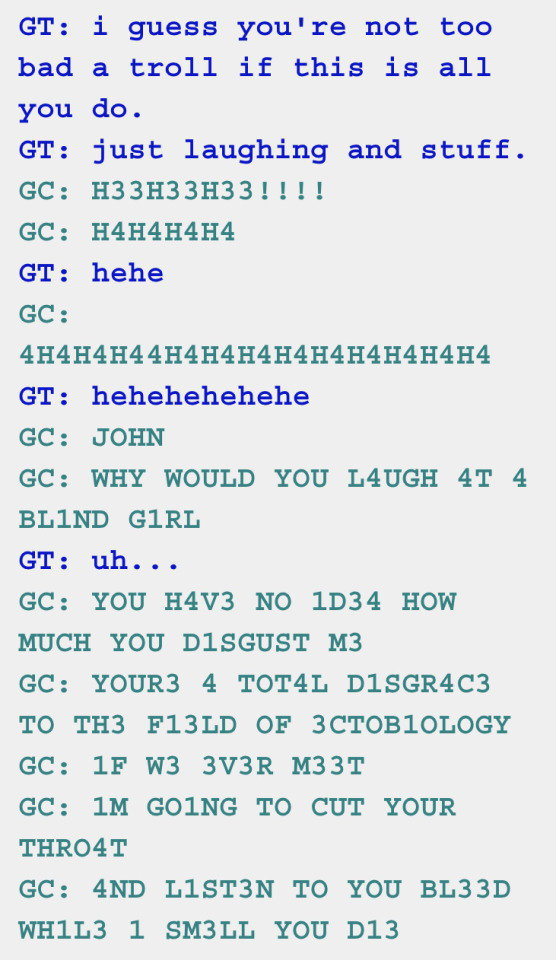
notice how terezi’s third response is the funny one?by setting up the pattern, both you and john are expecting her to keep laughing in response, so when terezi flips the script on him, it’s hilarious. that’s called payoff, or in this instance, comedic payoff. now we can compare that to dave’s irony, where it was mentioned three times on one panel. no subversions of expectations here! that’s because hussie wants to establish dave’s obsession with irony, and they did so by creating a pattern you would notice subconsciously. this is how the rule of three works! psychology is cool, right?
so now that we can all agree that the subtext here is related to the irony, we have a new problem: we’ve only gotten dave and rose’s perspectives. we still need one more to complete the rule of three. fuck. thank god i can skip ahead!
using my whimsical ability to read ahead analyze text, i find out what john said to dave, and leave out the unimportant bullshit for everyone’s sake (mostly mine though):
dear dave, happy birthday!!! (…) i got you these. they're totally authentic! they actually touched ben stiller's weird, sort of gaunt face at some point. i'm sure you'll dig them because i know you lolled so hard at that movie. ok so for real, this is sort of a shitty present, but it is an ironic present because i know you wouldn't have it any other way. maybe you can wear them ironically some time. they MIGHT even be more ironic than you and your bro's dumb pointy anime shades.
now we have three characters’ perspectives on dave’s behavior. you’re probably able to put together the pieces i’m putting down, but for those who aren’t getting it: when you compare john’s letter, with dave’s actions, and rose’s messages, you realize that: dave is keeping these glasses because he loves john, not because he likes ben stiller, but he can’t admit that to himself, hence why his narration overcompensates with the usage of irony! it’s worth noting that all of these examples are from dave’s pov, because switching to rose or john’s pov would no longer make them mouthpieces!
“okay but isn’t dave’s perspective not reliable either??” yes! that’s why we’re using his actions as textual evidence, not his statements. the fact dave kept these glasses, and hung up a picture of an actor he doesn’t even like, is the proof he loves john, not him saying outright that he loves him. like i said earlier, this is a comic intended for adults, so characters aren’t going to outright say themes or how they feel. that’s more for peppa pig, hannah montana, and riverdale, you feel me? just like in real life, talk is fucking cheap here.
so now we’re left with a new question: why does dave feel comfortable admitting his love for john to rose, but not john himself? i’m sure the answer is becoming obvious! putting all this together we can gather the following: hussie wants us to know that dave possibly has a crush on john, but definitely loves him.
wait a minute… possibly?!? that’s because we still need textual evidence dave likes men. luckily, like i mentioned earlier, we can skip ahead to the epilogues, where him and karkat get together in the meat timeline, thus proving dave has liked men this whole time. boom! that’s payoff!!!
now we can OFFICIALLY put together that dave had a crush on john. once again, notice how we’re using dave’s actions to prove this, and not just quotes! either way, now we have officially used media analysis to deduce that dave had a childhood crush on john! huzzah! pat yourself on the back my loyal reader.
and for those who still aren’t convinced of dave’s crush on john, this masterpost has way more evidence than i ever could fit in this post.
(trigger warning: csa)
so now with everything we’ve learned about media analysis, i present you with my own analysis: the puppets are a symbolism for abuse, and the sex puppets specifically are an allegory for CSA, or child s*xual ass*ult. symbolism is where you use a certain object to represent ideas or qualities. the best example of this is the iconic green house logo we see throughout the comic. in comparison, an allegory is when a certain object or plot device is used to get a point across, without directly stating the point itself, aka, a hidden meaning. for instance, hussie has said their game “pyscholonials” is an allegory for how they feel about their gender identity!
so now, let’s start finding textual evidence to back up my claims about the puppet allegory, through looking for textual evidence of dave’s symptoms, aka analyzing character psychology:
dave’s anxiety manifests in the way he types. according to healthline “rambling or excessive talking [is a sign of] social anxiety. you fear saying the wrong thing or being judged by others, but you end up talking more (…) in an effort to help make up for your anxiety, and help quiet the worries revolving around what others think of you”. this is basically dave’s whole personality, but more specifically, you can see him doing this around the puppets in this scene, he rambles to himself non stop when returning to his childhood bedroom, and he’s still doing so on the meteor when he can’t find terezi to do “some stuff”. by the end of the comic, dave even acknowledges this himself by saying: “DAVE: yo im hardly one to talk here since i am a goddamn geyser of hilariously self-pulverizing freudian bloopers”. it’s also worth mentioning that, generally speaking, dave also spams his friends a lot until he gets a response, implying he gets anxious when people don’t respond quick enough to him, which is a normal reaction after being neglected as a child. that’s called a trauma response! all of these bullet points are trauma responses that happen to people who had to deal with CSA. in this case, the trauma response would be dave’s anxiety in general, and not him spamming his friends specifically. moving along…
dave’s hypersexuality manifests in a pretty in a pretty straightforward way, hence him constantly making s*xual jokes, and him drawing dicks on stuff on the meteor, much to the annoyance of everyone else. terezi even points this out herself while dave is failing to grieve bro:
TG: im sorry you are so flustered by the mere mention of glittering mythical cryptodick it honestly makes me think youre not ready for the truth
GC: D4V3 YOUR P3RPL3XING 3UPH3MISMS INVOLVING WHAT I PR3SUM3 TO B3 L3WD 4ND VAGU3LY INTRIGUING PORTIONS OF HUMAN 4N4TOMY 1 THINK 4R3 NOT 4S HILARIOUS 4S YOU PROBABLY B3L13V3
his dissociation is also pretty straightforward. he constantly talks about himself in the third person, and treats himself like he’s a character in a story, rather than a person who has wants and needs. for reference, dave immediately pulls meta shenanigans when you meet him, foreshadowing his dissociation. you can tell it’s built up to an already toxic level when we meet him, because on the same day, he has almost no reaction to seeing his own corpse, and immediately disposes of it “for jade’s sake”, rather than his own. and to make matters worse, he immediately “moves on” as if nothing happened. deep pov, remember? he also couldn’t properly process bro’s death. once again, terezi tries to point this out to dave, and he’s still not getting the message. put a pin in this section for now.
near the end of the comic, davepetasprite outright says that davesprite was depressed, regularly talked about how he wanted to off himself, and implies he might of attempted it. this is a grey area since davesprite is technically a separate character, and grieving the death of everyone from his original timeline, but it feels weird to just ignore it. to each their own on this point, but i would assume davepetasprite was referring to dave’s whole life when they talked about him being depressed based on wording, and his terrible childhood, but the s**cidal stuff could go either way. again, the proof here is dave/davesprite’s actions, not davepetasprite’s quote itself.
he displays regressive behavior 24/7 by wearing his shades to avoid eye contact, refusing to participate in common social cues (i.e.: constant dick jokes), and the few times we see him get upset, he shuts down rather than feeling his emotions. not so fun fact, the only time dave cries in all of homestuck is because of onions being cut in front of him. there’s an allegory in this scene, can you find it? (hint: the dragons forced dave into the soup, but he refuses to get out of it) also, in his most emotional scene, he still tries his damndest to not talk about emotional stuff with dirk, and still doesn’t cry when they hug, despite discussing bro’s death, and his thoughts on his own abuse in detail:

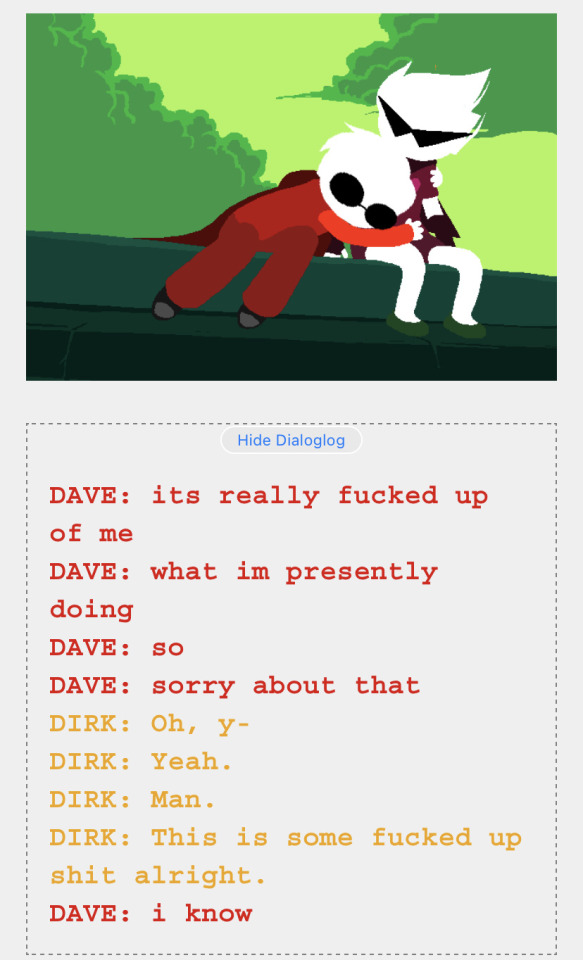
the lack of self esteem is pretty apparent. he constantly over compensates at the beginning of the comic, as seen below. he always talks about himself as if he’s a famous important guy, despite that all of his friends know he’s lying, and regularly say it to his face, but he’s still adamant that they’re wrong, or commits to the bit without actually admitting the truth. i wanna note that dave’s humor is always more of a commit to the bit and keep it going sort of thing, for better… or usually worse. not full on sarcasm. this is opposed to rose and john’s teenaged douchebaggery mixed with flagrant sarcasm. also, in the aforementioned scene above, davepetasprite still refers to davesprite as a piece of garbage, showing this is something dave struggles with even while being combined with nepeta. again, we’re using the action of putting himself down, not the quote itself. (also, sorry for the image quality, i’m on mobile)
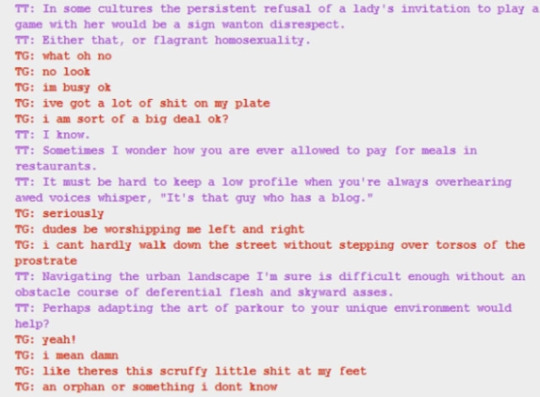
in the long term, it’s basically impossible for him to form long lasting, fulfilling, and romantic relationships. first, it’s his crush on john, but that’s just kids being kids stuff. there’s also the fact dave and rose had some sort of failed relationship in davesprite’s timeline, due to them not learning they’re siblings. then we see the serious problems arise with terezi, who he dates pre-retcon mostly just cause she’s there, and his weird definitely not gay rivalry with karkat, which leads to her being unfulfilled in their relationship, and starting a kismesistude with gamzee. obviously the jade stuff is a big wooooof (pun NOT intended), both with davesprite, and the candy timeline. ultimately, both times, dave only dates jade because he feels bad for not liking her back, which leads to the relationship falling apart both times. remember the pin in dissociation? that’s what he’s doing here. karkat would be the opposite of jade. dave doesn’t let himself date karkat because dave hates himself, and more specifically, his attraction to men, which i’ll elaborate on later. this is what we call a character foil, aka two characters who have similarities so you can contrast their differences. think naruto and sasuke, or uh, deku and bakugo i guess? how do you do fellow kids? actually yeah! cause jade is green, and karkat is red blooded, which would symbolize how dave sees karkat as the “wrong” choice, while jade is the “right” one. the colors green and red are opposites, but jade and karkat are both of dave’s love interests in the epilogues. see? character foils! symbolism! personally, i refer to this as “star wars logic”, cause the good guys have green lightsabers, and the bad guys have red ones. this is definitely intentional, seeing as homestuck is littered with star wars references, like how HIC is basically just darth vader. meenah is also definitely a reference to darth maul, just look at her double sided weapon, or how they both die before getting to their respective thrones. i could keep going but it’s not really relevant to the discussion.
so right now you might be thinking “well you still didn’t explain how dave got assaulted tho”, and that’s fair. however, i wanna remind you that showing children porn against their will is 100% a form of CSA, same with sex paraphernalia, and especially forcing sex paraphernalia onto them. to do that to a child non-stop, in an environment they can’t escape, would have horrid effects psychologically, and dave displays almost every one of them, as you saw with the textual evidence above. so when dave can’t admit to himself that he he hates bro’s puppets, and more specifically the sex ones, it’s because doing so would force him to admit: a) what bro did to him was wrong & b) that he enjoyed it in some aspect. john even points out how weird bro’s affinity for puppets is weird and definitively not cool, which causes dave to immediately shut him down hardcore (more allegory).
speaking from experience, one of the worst parts of CSA is that you have no clue what’s going on. victims of assault often blame themselves, or feel guilty of what happened, and children lack the ability to tell what’s fully going on in the first place, due to their brains being underdeveloped, thus amplifying the guilt and blame. people often worry so much about the “man tricking kids with candy” because it’s the most pervasive p****ph*le you see in media (god i hate true crime culture), that people forget that 84% of csa happens in the home, 50% of the time it’s someone the child trusts, and 40% of time it’s family members specifically. even if 99% of your experience is terrible, you’ll still find a way to blame yourself for the 1% until you can properly process that you didn’t do anything wrong. this is what’s referred to as the “the myth of the perfect victim”.
i know this is “personal speculation”, but to me, it seems very apparent that dave is gay, and can’t come to terms with it because of his CSA trauma, hence his inability to just admit to himself he has a crush on john. every girl he dates in the main comic is quite literally the ONLY dateable girl in front of him, or usually the only girl in front of him at all, and all three girls have crushes on him/flirt with him WAY before he starts their relationships. and once again, he only dates jade in the epilogues due to his own guilt and dissociation, combined with her doing everything short of forcing herself onto him. compulsive heterosexuality is a major part of homestuck. for instance, hussie has confirmed via author’s notes that rose had a crush on dave when they were kids, and that something happened between them when they never learned they were siblings on davesprite’s timeline, yet hussie has also said that rose is a full on lesbian. that’s comphet, and it’s very intentional!
i also wanna take a moment to acknowledge that dave and rose are 100% nods to luke skywalker and princess leia, who also kiss before finding out they’re related. notice how dave fights with swords, like a lightsaber, and has the same hair as luke. meanwhile, rose’s seer of light powers are basically the same as leia’s force powers, and she uses most of her weapons as blasters, just like leia. i don’t think hussie was trying to be weird or add this stuff in for any unsavory reasons, like some people imply. there’s a reason all of this extremely vague, and not shown on screen. put a pin in that.
so in the same way the katanas in dave’s fridge symbolize bro prioritizing preparing dave for battle over what he actually needs (food and shelter), that’s how the puppets symbolize dave’s CSA. now, if you read dave and rose’s conversation about the sex puppets with that knowledge, it starts to paint the harrowing picture (again, allegory). it’s important to remember that rose had a canonically had a crush on dave at the time during this conversation, so she was probably just negging him the same way she negs her mom. she was upset because she knew that dave liked john, and probably was just gay in general, so he was never going to like her back. she’s definitely projecting her gayness (and love of puppets) onto dave too. again, all of this is definitely comphet lesbian behavior. all that’s to say, i’m not claiming she’s intentionally victim blaming him or anything during this scene. she’s just as much of a child as he is. put a pin in that too! i got sited sources coming, but i can only put so many goddamn words and images in a single post.
so, i see the sentiment shared a lot that hussie just tacked on the abuse stuff at the end, and that the beginning of homestuck “was just a silly comic at the beginning it’s not that deep”. that is an objectively ill informed take, and now you know why! the entirety of homestuck’s themes are exploring the effects of child abuse and neglect, hence the name, home stuck. there’s a reason the protagonist who is able to save everyone, also has a seemingly perfect home life. notably, the only other character who’s a completely well adjusted nice person is nepeta. she’s also the only character who’s able to free roam as she pleases, has a loving lusus, and ironically, is the only character without a home/hive to begin with. once she makes into the game, her land is quite literally her cup of tea as well. these definitely aren’t coincidences. i hope your allegory alarms are going off right now!
the only reason homestuck is sillier in the beginning is solely because it was a fan lead project for the first few acts. back in the day, there were forums dedicated for audience input to decide what happens next in the story. fun fact: this is how a lot the characters names were decided as well! so there’s a reoccurring bit where (insert beta kid) does (something stupid) and then the plot just moves on (i.e. john’s HILARIOUS antics). those were the silly suggestions sent in by the fan community! that was back when the homestuck community was still pretty small, all things considered. this explains the wonky pacing in the first few acts, and the more comedic tone.
moving on, the reason the puppets and the katana fridge are used as symbols, is because yeah, the tone would be way too dark if they played that straight. however, there’s another reason that’s way more important. remember how homestuck is written with a deep pov, aka unreliable narration? (please don’t kill me pedantics police!!!) hussie uses deep pov to display how homestuck chacters see their parents/lusii, in order to convey the themes of the story. stick around a bit longer and i’ll explain the theme of homestuck! just let me explain something real quick, so you get the big picture.
bro is shown in a positive zany light because that’s how dave sees him. to dave, bro is his whacky older brother, and sure he’s a little out there, but ninja battles and puppets are sick as fuck, right? well we as the audience know that’s NOT the case. again, dave is literally starved on screen, and gets the shit beaten out of him, also on screen. this parallels rose’s relationship with her mom, who gives her everything she could ever want and need, but doesn’t fulfill rose’s emotional needs, so rose sees her as a some sort of spiteful cartoon villain. dave even calls this out the second he sees all the wizard stuff rose got from her mom.
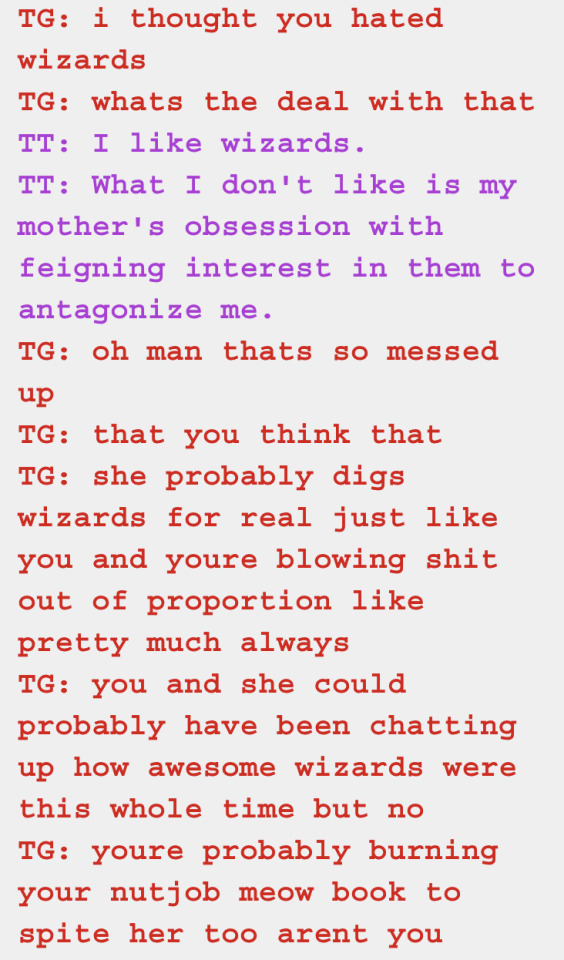
meanwhile, you can see rose admit to liking the puppets here, and she says she’s a fan of bro’s pornbot websites as well.
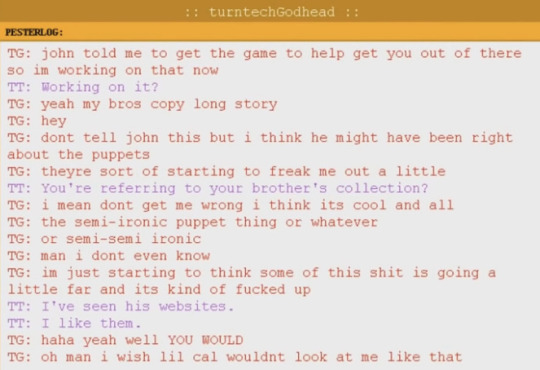
ultimately, they both want what each other has, but aren’t really able to fully grasp why their own parents did what they did, much less each other’s parents, which leads to them both envying the toxic part of each other’s households. i’m sure you’re starting to see the big picture with the puppets now, so to send the point home, remember that image i showed you during dave and bro’s strife? well, bro is attacking dave with a puppet, and dave wants to abscond, but can’t, perfectly paralleling dave’s abuse to a puppet. furthermore, that’s why he’s surrounded by sex puppets specifically, and they’re all throughout his apartment. it’s all symbolism for how dave is trapped in home dealing with CSA.
this is the purpose of allegory, telling you something without directly showing it. i doubt any of us think homestuck would be better if this stuff was depicted literally, for all the obvious reasons. i’ll close out with this dialogue since it shows what i mean better than i ever could myself:
DAVE: why did i get such a raw cut of the asshole deck? and why did it take me so long to figure that out? and like hes dead now so thats that. so all thats left to do is look back and try to put the pieces together of my first 13 years, and all i can think is what the fuck WAS that?!
DAVE: i dont come away with the impression i used to try convincing myself of, that he was like "mysterious" or "stern" or "aloof". the only feeling left is this insane impression that i was raised by somebody who fuckin HATED me, and the whole act of even "raising a child" was some totally fucked up game to him.
DIRK: What… did he do?
DAVE: i dont want to get out the laundry list, but for reference laundry wasnt one of those things. that was just one of the many little domestic things i just had to sort of FIGURE OUT. sorta like i eventually had to learn what the REAL purpose of a refridgerator was from movies.
DIRK: Wait. What???
DAVE: i dunno theres too much to even get into. just- i dont remember the atmosphere ever not being nerve wracking. all havin to sneak around and... ugh my shitty childhood spider senses are tinglin just thinking about it.
DAVE: it was "training" you know?
DAVE: but you know what it really was, it was some vicious shit that was bad and sucked and i hated it
DAVE: it didnt make me stronger
DAVE: it did the opposite
DAVE: it made me never want to fight
DAVE: it made me never want to see blood or be near danger or hear metal sounds
DAVE: it made me hate the idea of being a hero cause he was a hero and he ruined the idea of heroism
(…)
DAVE: i know how it sounds but i am NOT joking and there is NO shred of doubt in my mind that he loved all those puppets more than me
so uh, this essay is already long enough, and you definitely want me to just say the theme by now, so let’s explain the rest of this allegory in optional bullet points that you should definitely still read.
rose liking the puppets is symbolism for how emotionally neglected children often end up subconsciously “wanting” terrible things to them, like abuse or self harm, so they can justify their own unhappiness with their lives, due to them not understanding that their emotional needs aren’t being fufilled. again, the myth of the perfect victim, starting during childhood specifically. rose does this by convincing herself that her mom hates her, rather than seeing that her mom is trying her best to parent, and failing miserably. rose is also unaware of her mother’s alcoholism, which symbolizes how she doesn’t understand that her mother is emotionally neglecting her. this parallels how dave is seemingly caught off guard by dirk’s sexuality, and thus bro’s sexuality, due to dave not processing that his abuse is sexual in nature.
jade’s love of plushies parallels dave’s love, and eventual hatred, for puppets. (once again, notice the red vs green. character foils!) this is because her neglect causes her to become extremely immature. when she’s a kid, this mostly just manifests as her liking children’s toys, and speaking with a childish affectation. however, this immaturity goes unchecked, leading to the epilogues, where she completely ruins dave and karkat’s relationship for her own sexual desires (paraphrasing). you could say the same for her secretly getting rose pregnant in hs^2, knowing kanaya will be upset when she finds out. basically, she has a huge emotional disregard for everyone around her, which stems from her almost complete isolation for most of her childhood. once again, emotional neglect leading to regression, more specifically maturity regression in her case, which makes sense when you remember she grew up raised by an actual dog. and interestingly, dogs have low emotional intelligence compared to other animals. jade herself becomes part dog while going godtier, right as she has to go into further isolation during the three year journey. dogtier symbolism! jadesprite also throws a tantrum when she’s created, right after being combined with a dog. more symbolism!
dirk loving cal is an allegory how he can’t let go of his own self abuse, which becomes extremely literal when he cuts his head off. something something symbolism. this is also foreshadowing his eventual role as the villain of the story once he achieves his ultimate self, and begins thrusting abuse onto others. after going ult, dirk ends up pushing jane into presidency, thus allowing a troll genocide to happen. it’s also worth mentioning jane r*pes jake in the epilogues, and while knowing this, dirk still supports her because he believes “the ends justify the means” during all of this. now he’s officially just as bad as bro at this point. i also wanna point out that this, once again, this makes dirk a huge foil to dave, with both of them helping their respective presidential picks to win the election. i believe this is hinting that dave will eventually be the one to defeat dirk, thus finally not letting his bro have power over him, or anyone else for that matter. remember how dave is a reference to luke skywalker? well the main villain of homestuck^2 is his father figure from another timeline/universe, so at this point, it seems like dave will have to be the one to do the killing blow on dirk, the same way luke did to vader. only time will tell. pun intended bitch. also, dirk’s shade of orange is right in between dave’s, and the yellow bloods, possibly symbolizing how dirk is doomed by the narrative just like sollux, mituna, and the Ψiioniic, combined with his own self abuse.
roxy has seemingly no affinity or hatred for puppets, dolls, or plushes, foreshadowing her failed assassination attempt on the batterwitch, and her short lived alcoholism. however, she does still have a pile of cat and wizard plushes in her room. roxy is probably the third most well adjusted character in all of homestuck, and had a pretty nice childhood all things considered! obviously it wasn’t perfect though, hence the short bout of alcoholism. all that fits into my puppet theory pretty well, implying that roxy made it to the end of her game due to her lack of alcoholism, unlike her alpha self, but just like rose. her shade of pink being the middle ground of dave and rose’s makes sense as well.
on davesprite’s timeline, his sprite prototypes with cal, and one of the birds who never left his apartment, symbolizing how he was unable to escape the trauma of his abuse and homelife. also another easter egg! crows are the smartest bird, and one of the smartest animals in the animal kingdom. this is symbolizing how dave is actually the smartest member of his session, which makes sense due to the sheer amount of math he does for his sylladex, despite bro not bothering with his homeschooling. this is why davesprite’s wings are clipped, to symbolize how his neglect and abuse ultimately made him worse off, rather than “being the air beneath his wings”. actual dave notably fights with a clipped sword, can you guess what that symbolizes? (hint: bro clipped the sword)
john interestingly fits into this as well, due to him receiving a harlequin doll for his birthday, and it later prototyping his kernelsprite. john hates clowns, and is the main character, which interestingly foils gamzee, who loves all things clown, and is relegated to a joke background character. let’s just put another pin in john and gamzee for now! i promise it will pay off.
but most importantly, lord english is the referred to as “the 8ig 8ad” by vriska (not a coincidence! think about spidermom!!!), and lil cal himself is referred to as the “most important character in homestuck”. notably, lord english is also the mind behind lil cal. this symbolizes how abuse is a central theme of homestuck, and the last trial the characters must overcome. that’s why rose stops drinking after the retcon, and why dave starts… doing something with karkat?
so there’s a huge elephant in the room! if we’re discussing davekat, we have to to mention the contentious reveal scene, don’t we? forgive me, but we have to address all the little nuances of this. so uh, remember dave’s anxious speaking habit we’ve established? well he starts blabbering when karkat immediately brings up his old black feelings for john, most likely implying he’s a little jealous/insecure about that. this is pretty normal, cause he’s still teenager at the end of the day. you can see it specifically in these two lines:
DAVE: so are you SURE you still dont have these unreconciled blackrom feelings about john
DAVE: i say we air this out before it ferments into some rank and hella unexamined feeling sauce
see? remember what i said about dave having trauma responses? this is it. he’s just anxious karkat might still like john, thus ruining their relationship, or uh, situationship at the time. he also might be projecting his romantic attraction to john onto karkat as well. then, he rambles a bunch of incoherent bullshit when john asks what his sexuality is. karkat is extremely embarrassed by this part of the conversation, yet he was able to calmly discuss his old crush on john. so this all comes to a head with the following dialogue:
JOHN: did you... like, date any boys?
DAVE: uh
JOHN: but there weren't even that many boys on the meteor? well, there's the clown guy, but i don't really see you and him... that really only leaves... um, were you and karkat... ARE you and karkat, like. hmm.
this makes karkat officially loses it due to embarrassment, but i’ll spare you from that huge wall of text. next dialogue reads:
JOHN: dave, i'm pretty sure we're making karkat uncomfortable now.
DAVE: yeah maybe we should drop this
JOHN: ok.
so lets think. they aren’t dating, but they definitely did something kinda gay. notably, this parallels the “things” dave did with terezi pre-retcon, while still being tastefully vague. the idea that dave did some gay teenager shenanigans actually does make sense for his character arc, because it implies he’s comfortable enough now to try something like that now. though i do wanna emphasize that i’m not try to explicitly say they had sex, i’m just saying dave explored his sexuality. come to the conclusions you’re comfortable with here! hussie goes out of their way to not display or mention characters doing any sex acts while they are minors, and this is the closest we ever get to anything like that. there’s only one instance of making out even happening in homestuck, and it’s just jake making out with his avatar poster. well, unless you wanna count this i guess? considering everything we’ve gone over in this post, this is most definitely intentional.
through john’s retcons, the butterfly effect forces the dave and rose to address their respective childhood traumas, which leads to them being able to beat the game. same with davepetasprite finally giving jade the closure she needed right before she woke up. same with terezi fixing her relationship with vriska. karkat runs for president later, proving he’s got over his leadership trauma as well. that’s how you win sburb. john saving everyone with that retcon shows the central theme of homestuck: you can change at any point, and get through any hard times, as long as you have people in your life to help and support you. the retcon is great because it shows you how a timeline is doomed, so that way you can understand why they won.
EB: well to be honest, i never really believed any of your guys's doom and gloom nonsense. not because i think you are lying... i just feel like there must still be a way to win! (…) also, there is always hope for someone who has good friends to count on!
so when dave and karkat start getting together, and do “stuff” on the meteor, that’s all the tasteful way of saying: dave was able to process things, and become more comfortable with himself. again, this totally could’ve just been making out, come to the conclusions you want. the vagueness is intentional.
notably, vriska, dirk, jake, gamzee, and jane are the only surviving characters to not address their trauma at all by the ending, which leads into their current arcs in homestuck^2 (or lack thereof in gamzee’s case). there’s also one more character, who we’ve carefully left pins in until now….
it’s time to address june egbert. spare the torches and pitchforks please! i’ve done a ridiculous amount of research, and there still doesn’t seem to be a proper explanation for june egbert from either a homestuck fan or a creator behind homestuck, so i’ll bare the cross of this explanation. from here on out, i’ll still say both names interchangeably for pedantic reasons, but that’s solely because this is still in a weird state of schrödinger’s canon, and hs^2 is pretty much it’s own thing in itself. but i’m a trans woman so w/e. once again, spare the pitchforks! please!
the reason why her being trans works is because john/june spent the whole series so focused on saving everyone else, that she never focused on herself, or thought too deeply about anything. that’s kind of her thing, taking everything at face value, and not thinking too deeply about herself (i wonder why… ♾️). this is even pointed out by dave himself during The Davekat Scene™:
DAVE: ok i guess what im saying is… i dont think its all as simple as you think it is, or maybe not like ACTIVELY think it is but continue to assume it is on account of NOT thinkin about it much, due to a lot of junk about the subject that gets shoved into our brains from movies and stuff while we were just dumb kids
JOHN: i,
JOHN: hm.
so you see the set up here right? the character who i was referring to, who still hadn’t processed their childhood? it’s important to realize that june/john has never actually had a character arc herself, because her story is told via the hero’s journey structure, not a typical three act story structure like almost every other character receives in their arcs. ever notice how homestuck is constantly compared to the odyssey or the iliad? that’s why! this all means, june/john is a plot motivated character, rather than a self motivated one, again, like almost the rest of the entire cast. it makes sense for her to have to start self introspection once the game is over, she never really had the chance to while saving everyone else. interestingly, vriska’s arc is told in the format of the hero’s journey as well. dave/davebot’s arc in the epilogues and hs^2 is also told in the format of the hero’s journey. he seems to be in between “woman as the temptress” (aka jade) and the “atonement” stage, which would most definitely be finally seeing karkat again, something hs^2 is still building up to. this makes sense for all three characters, seeing as being a “hero” plays huge parts of all of their respective storylines.
i also wanna bring up the clown stuff again, and more specifically, gamzee. even more specifically, this amazing analysis by @abcq2:
before murderstuck, gamzee has no idea that he is a clown. sure, he anoints his face with greasepaint, rides a unicycle, and juggles, but these are serious religious sacraments to him. and, sure, sometimes he trips on his giant floppy shoes and lands face first in a pie, but that's just being blessed with a miracle, because he was just thinking about pie. and, sure, sometimes his friends say things like "HEY ASSHOLE. CLOWN ASSHOLE. YOU WORSHIP A CLOWN RELIGXON. FOR CLOWNS." to him, but he's too zonked on sopor slime to extract any meaning from it. when gamzee sees the ICP miracles video, he's too sober to dismiss it as a mere coincidence; for once, he gets the joke, and realises that he was the butt of the joke the whole time. he understands that every time he fell face first in a pie, it was the work of an unsen riddler. he grasps that he is, in a cosmic sense, a clown, and hates it. (…) when the murder spree is over, gamzee's beatific grin returns; no longer a look of blank ignorance, but a knowing smirk. he's successfully ruined his character forever - no one wants to see him and no one thinks he's funny. hussie seems to say: jesus you are such a shitty clown. and gamzee's impassive face seems to say: i know. gamzee refuses to clown out of spite, and hussie refuses to remove gamzee from the story out of spite. it's a committed relationship of reciprocal, mutual antagonism. what i'm saying is that hussie and gamzee ar-
once again, all credit for this gamzee analysis goes to @abcq2, please check them out!!!
so i’ll cut straight to the chase, mostly due to me getting close to tumblr’s character limit. the clowns are an allegory/symbol of being transgender. it’s impossible to ignore. remember that game i told you about? psycholonials? if you’ve ever played it, you’d know that clowns and transgenderism are tied up together in one big scene. i won’t spoil the game, it’s really good! check it out! this parallels homestuck, where june has always been associated clowns. not a coincidence. once you fit gamzee into this equation, it’s clear that gamzee’s “clown” dysphoria is a stand in for gender dysphoria. read the analysis above one last time and tell me i’m wrong. hussie themself has only posted themself in clown makeup since 2020, this started exactly half a year before they unofficially came out as non-binary via a homestuck announcement. they also tweeted that they use any pronouns shortly afterwards, on a private (?) twitter account. it’s also worth mentioning that one of the few of photos of hussie that we have, they were in ICP/juggalo stuff just like gamzee, and this photo was taken in october of 2010, mere months after gamzee’s introduction, and possibly a month or less after act 5 act 1 was finished. if you know anything about this image, or tumblr user @dead12234352356456775, please message me! this blog is the earliest place the picture can be tracked to, and i’d love to ask OP if they know anything about this image. hussie has notably referred to themselves “clown gender” as well. it’s unclear to me whether hussie actually likes icp, or if this is one huge coming out ARG, but either way, clowns = trans, got it?
so when john/june have a clown sprite following her around, it’s an allegory for how the trans stuff is literally in her face, but she can’t understand it!
“but there’s no textual evidence of john wanting to be a girl!!” see, we’ve officially waded deep all the way into the murkey grey waters of nuance. so if you don’t know, june is the embodiment of what us trans women refer to as the “pre-egg crack”, aka, the phase before you realize you’re trans. this phrase applies to all trans people, but trans women use/identify with it the most, just cause we usually come out way later, usually around say, 20-23, like john/june is by the end of homestuck! huh, what a coincidence. in all seriousness, this is because most trans women start their transitions when they first live on their own. john/june’s also a computer scientist by hobby, something a lot of trans women do. this is because trans women are one of the smallest minority groups, so we usually have to go resort to online communities to talk to each other. this is also necessary for a lot of us, due to research on hrt not really being as advanced as it should be, and the fact transitioning is still illegal/hard to access in a lot of areas. trans women are also likely to stay inside on our computers cause yknow… dysphoria. plus computer jobs often have decent pay, low barrier to entry, and require little to no interaction with other people in person, making them perfect to both medically and socially transition. sure, june never outright says “i want to wear a dress” or laments about dysphoria, but again, homestuck is by adults for adults. the story shouldn’t have to explain something like this to you. the only reason you had the impression that there’s no evidence of john being trans is because you weren’t educated on the subject matter, but now you are!
“you’re just projecting onto this character!!!” and you are too! again, that’s how everyone engages with art. to think you don’t do the same yourself is foolish. utter poppycock even! however, i really despise this sentiment. the fact i’m a trans woman makes me the most qualified to speak on this subject, not the other way around. who are you to speak on the experiences of trans women? exactly. i’m tired of us trans women being berated for headcanoning characters as trans women, even when it’s extremely obvious why we do as such. it’s always the boils back down to the same bullshit in response: “well actually YOU’RE the transphobic one for saying all trans women look/act the same!!!” *sigh* that is literally the definition of an identity. you sound dumb, and are speaking over actual trans women, whose opinions are infinitely more important than yours when it comes to this subject. this is literally just the “what is a woman” debate repackaged with the guise of liberalism. it’s annoying.
“all this june stuff came out of nowhere!!!” this headcanon became prevalent during the pandemic, where tons of trans people were able to start their transitions! i did this myself, and so did hussie. doesn’t seem so random now, does it?
“hussie is just doing this for woke/fandom points!!!” uh, and what would they be gaining by making john trans? if this was about making money, wouldn’t the merch link on the official website work? hussie makes visual novels now, and has removed themselves from homestuck as much as feasibly possible, while still maintaining their ownership of the IP. not exactly the most lucrative career path. and if you’re implying hussie is adding any element to homestuck simply to please fans (yes, that includes davekat), you obviously know nothing about hussie. go on reddit, read ANY responses to the epilogues, or the plot of homestuck^2, and tell me when you find the tons of people happy with their contents. oh, and see how homestuck fans feel about kankri and cronus while you’re at it. i’ll wait.
“okay but the toblerone stuff is dumb!!!” at no point before the june wish did hussie say that finding a toblerone would give the finder the power to make a canon-altering wish. as you can see here, all of the wishes weren’t even granted, some of which have no impact on canon at all. if hussie wanted to, they were well within their rights to go “yeah no, this is dumb, sorry” when the wish for june egbert was sent in. this means that june egbert already fit into hussie’s idea of canon, and as i’ve already pointed out, june egbert has properly been foreshadowed, so this all adds up. the idea that hussie “turned john transgender because of a toblerone” is an exaggeration of events perpetuated by losers misguided and ill informed fans. hussie has been sent an insurmountable amount of headcanons over the years, and aysha u farah, who has had major involvement for multiple homestuck projects over the years, has said “the only headcanon i've ever seen andrew get excited about is june egbert” on a now defunct podcast called perfectly generic podcast. (forgive me, but any links to the specific episode i’m finding no longer work due to their official website no longer working. i’m not listening to hundreds of hours of an archived podcast for this minuscule of a clip. be my guest if you want to take that on! once again, message me, and i’ll update this section.)
either way, based on everything we know, june egbert is canon because hussie wanted this prior to the toblerone wish, because if the wish contradicted or retconned canon, it wouldn’t have been granted in the first place. simply put, june egbert is canon because it’s want hussie wanted to begin with, and the wish came after that. once again, the sheer amount of foreshadowing here should be more than enough proof, and if you want more even more proof of june egbert foreshadowing, check out this blog post! it’s great!
“well it’s dumbledore logic!!!!!!!!!” is it though? j.k. rowling is a transphobic bigot, who’s works cost money to access, who confirmed dumbledore was gay only after he died, and then she still straight-washed him in future harry potter media. hussie is an actual trans person, running an indie project, who wrote one of the longest literary works in the entire english language, made it all free to access, supports all fan archives, and hasn’t even ended homestuck^2, where john/june is very much alive. and once again, the wishes were to add something to post canon content specifically, without shifting the canon of the main series. homestuck^2 is still updating, and as far as we know now, more projects are on the way, like the completion of hs^2 and hiveswap. these situations have almost nothing in common aside from deriving from twitter. if you’re mad about this, were you mad when jake was confirmed to be brazilian in a youtube livestream comment? or when gamzee’s red crush on tavros was confirmed via a dubiously canon comic? probably not. eh, maybe you were actually, i don’t know you. either way, feel how you wanna feel about jake being brazilian, i don’t care, but you can’t say there was “nothing building up to june egbert” now that you’ve read this essay. the dumbledore comparison is dumb as hell.
“well i’m trans and i don’t feel represented by june!!!” if you’re “feeling unrepresented” by june, it’s probably just because you’re not a trans woman obsessed with computer science. that’s just you not relating to the character. it’s really not much deeper than that. and on that point…
“well i just don’t like this!!!” with all due respect, you seriously need to put thought into why that is. i can’t think of a single non-transphobic to be upset about a character transitioning in a story. and again, homestuck is one of the longest literary works in the entire language, and is completely free to access. in all of homestuck history, not a single product was sold under the guise that “john will be cisgender forever” or “dave will not end up with karkat” or “jake will never be brazilian”. hussie doesn’t owe anyone any part of their story’s canon. it’s their story, full stop, and if you’re mad about that, you’re entitled to something that was never yours to begin with. not all art is made purely for your consumption, and free art is especially not made for your consumption. can you critique it? absolutely. there’s a big difference between criticism and bashing though. if you don’t like any part of homestuck, write a fan fiction, make some fanart, or write an oddly soapboxy essay about your personal fan theories and headcanons. turn that negative energy to make something positive! i’m being serious! hussie themself encourages this!!!
“okay but it’s still lame the davekat stuff happened off screen” i can agree to a certain extent, but dave and karkat’s relationship plays a major part in the epilogues, as well as homestuck^2, and that’s not even unpacking their weird borderline black rom dynamics pre-retcon. to act as though their romance starts and stops during one intermission really downplays how seriously their relationship is taken throughout the homestuck series.
“okay but isn’t a lot of that stuff dubiously canon?” baby, everything is canon. hussie has said so themself. there are infinite possibilities for what could have happened during homestuck, so maybe we should just focus on the fact it’s taken seriously at all? honestly, the line between dubiously canon and actual canon is paper thin. homestuck^2’s entire plot is currently deconstructing what canon even means. if you wanna only see the main series as canon, be my guest, but the accusations of homophobia and queerbaiting over the davekat reveal are a little ridiculous. their relationship plays a major part in all homestuck content for years now. also, big reminder that, with the reveal of june egbert, there’s now only one canonically straight character from the main series, and she’s a villain now, so…
“well you’re just strawmanning me now!!!” my loyal reader, i understand you are a human being with infinite nuances i will never be able to understand, cause quite frankly, i have no clue who you are to begin with. i don’t think everyone who hates davekat or june egbert is some anti-lgbt bigot. i’m just here to set the record straight, and provide context for people who are willing to listen. a lot of this shit is confusing, and there’s misinformation a plenty out there. most people who are participating in this discussion clearly haven’t bothered reading homestuck for years at this point, possibly even a decade. and that’s fair, most of us read it as kids, and probably stopped by the final update, if not sooner. honestly, i think the main issue here is that people are playing the telephone game via fandom discourse. that’s how we went from “hussie supports june egbert” to “hussie made john being transgender canon cause of a candy bar” in the first place. if you’re participating in this discussion, maybe try rereading homestuck before you let your vague memories of reading the comic years ago define your current day opinions? besides, i’m not delusional enough to think any bigots are going to read this post and be convinced, but i’m sure i can open up the minds and eyes of people who are willing to listen! give homestuck a reread, imagine how much more foreshadowing has gone unnoticed over the years!
i feel the need to be so thorough, bust out so many references, break down every bit of nuance, and speak from my own experiences, because inevitably, a small group of people are gonna read this post and still go “it’s not that deep! they’re just puppets! june egbert is a bunch of sjw malarkey!!!”, and to those people, i hope you stop making fandom spaces miserable because you didn’t wanna pay attention in english class. media analysis is a necessary tool, and i’m sorry our education system here in america failed both you and i. (or maybe your a non-american country has english classes as terrible as ours? idk.)
honestly, i think i read like five or six books in throughout of all high school. i failed english my freshman year, and dropped out by my senior year. there’s always room to grow though! look at how i’m able to write this essay now! all you have to do is just watch some video essays that break down your favorite movies, tv shows, books, and more!!! there’s tons of jackasses like me who will lament about their hyperfixations. plus, now you already know what symbolism, the rule of three, and allegories are! before you know it YOU’LL be the one noticing all of the easter eggs in the media you enjoy, just like us the rest of us pretentious media analysis fuckheads.
i’m sure all of us are old enough to remember how exciting it was when rosemary was first confirmed, or when the dirkjake kiss happened, or all the recent stuff with davekat. and guess what, june egbert is going to be that lots of young trans women! after reading all of this, is hating june egbert the hill you’re gonna die on?
you know, hussie practically uses homestuck as their personal diary. i don’t think anyone’s denying that. it shouldn’t take a rocket scientist to understand why they want their main character to be trans, or why they wanted dave to end up with karkat. maybe you’re just not willing to understand it? if we’re allowed to project on to these characters, then why won’t you let hussie?
if you got to the bottom of this post, thanks for reading! i might turn this into a video essay if i’m being honest, but if you wanna repost this, or make your own response, please just credit me! also check out my homestuck fanworks if you like this post, i’m sure you’ll like them too!!! i don’t really have anything else to promote so uh…. if you’re on the homestuck^2 team and read this…pleasefortheloveofgodiwouldkilltoworkonanofficialhomestuckprojectidontevencarewhowhenwhenwhereorhowbutillsettleforanytjingpLEdareplelaplwlalsplelallaldle
in all seriousness, thanks for reading! i doubt this post will take off simply due to how long it is. i’d love to hear other people’s thoughts and opinions on this, or possibly make mutuals to yap with even! dear lord i miss having friends to talk about homestuck with. also sorry for the censors, normally i wouldn’t bother with something like that, but i’ve been working on this non-stop for the past few days, so i don’t wanna risk it being taken down.
anyways….. THAT’S why i have the bro strider tag muted 😭
(EDIT ON 9/15/24: added a new source i found and fixed some minor grammatical errors)
#one of my essays#homestuck#dave strider#davekat#webcomic#june egbert#bro strider#rose lalonde#media analysis#gamzee makara#dirk strider#roxy lalonde#john egbert#psycholonials#vriska serket#tw alcohol#tw csa#tw child abuse#tw abuse#tw childhood trauma
71 notes
·
View notes
Text
What was up with Chris Thorndyke, anyway?
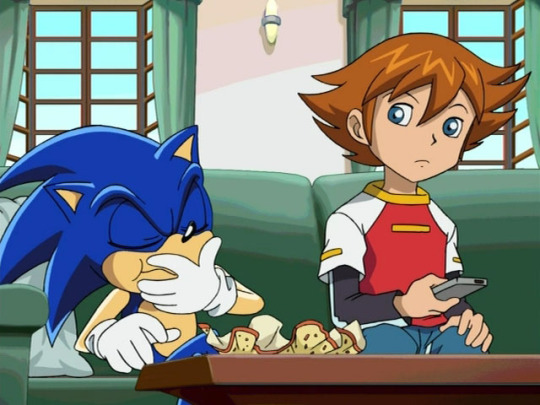
I think it’s safe to say that Chris Thorndyke is one of the most hated characters in the Sonic the Hedgehog franchise, which is... a bit odd, when you think about it. In a world of Ken Penders’s Daddy Issues Personified and Octopus Who Kills Children For Fun (the latter of which basically being a fandom sexyman), why is a twelve-year-old boy so polarizing?
It would be easy to chalk this up to the bad 4kidz dub, but I don’t quite think that’s it. A lot of the complaints I’ve heard can go to “he got the main character slot in Sonic’s show” or “I just don’t like the human characters,” which are valid, but pale in comparison to basically all I’ve seen being: “He’s just annoying,” “I can’t fucking stand him,” etc. That’s basically all I hear, and when asking why, it usually boils down to two things: 1) his extreme attachment to Sonic and 2) his status as a rich white american only child basically puts any and all of his problems at “first world problems” at best. Those also seem like valid reasons, right?
Thing is, while on the surface it seems like this kid has no issues, as a kid with a, how you say, rough childhood, something stuck with me when I watched the show for the first time. I remember sitting through episode after episode, wondering, When does Chris stop being sympathetic and start being annoying? Since, you know, that’s his reputation.
It didn’t happen.
And it slowly became apparent to me that a lot of the things that made Chris “annoying” and “obsessive”... were just obvious symptoms of a traumatized kid.
Join me for my thesis presentation: Chris’s “annoying” traits are not a writing flaw, but an intentional character flaw brought about by severe neglect, which is resolved through his character arc, and why the fandom reaction to him is so furious.
Note: Throughout this meta, we will only be looking over the Japanese version of Sonic X, as it’s the original script and 4kidz did not translate it accurately. So if you see some lines you don’t remember being said, those are from the English subtitles/direct translation.
Once again, it is possible (also likely, we’ll discuss that a bit) that the kidification and cuts to Sonic X did a number on Chris’s likability, but for most of the meta we’ll be discussing his Japanese characterization with only a few references to cut scenes or lines in the dub.
Part I: First Impressions
On the surface, Chris seems like not just a normal kid, but a very privileged one. He goes to regular school with regular friends, but also goes home to a mansion and millions of dollars. His parents dote on him, his grandfather has fun with him, the two servants treat him like their own kid. He should have no problems, right?
Except, honestly, the issues become apparent in Episode One.
You may be saying here, “What do you mean, episode one? The second episode is when Chris gets all his characterization and exposition.”
Except we get all this visually in the final scene of the episode. (I PROMISE the whole essay won’t be this analytic over small scenes but this is important.)
Before Chris rescues Sonic, kickstarting his part in the plot, we see him hear Sonic fall, peer out the window, and then run out to get him.
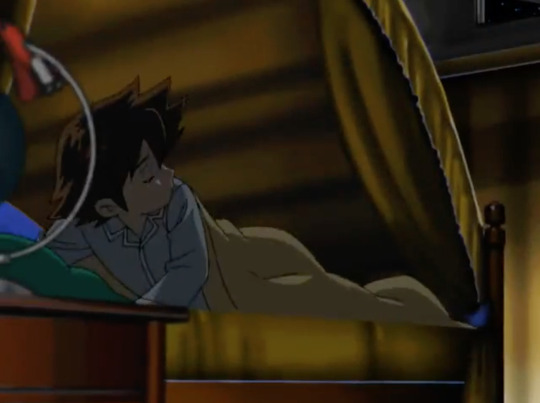

Firstly, the shots of his room. His room is huge– and we’ll come back to that detail later, so keep it in mind– but it’s also dark. Which tracks ofc, it’s nighttime and the kid’s asleep, but there’s also a lit desk light, which we see when Chris goes to the window. This together gives the audience the visual impression that Chris is in the dark, with the light only coming when he opens that window and sees Sonic.
Let’s get into the bigness of the house here, as Chris runs out of the room. In every shot we see him running, it’s emphasized how small he is. No, not only how small he is, but how empty the rest of the house is.
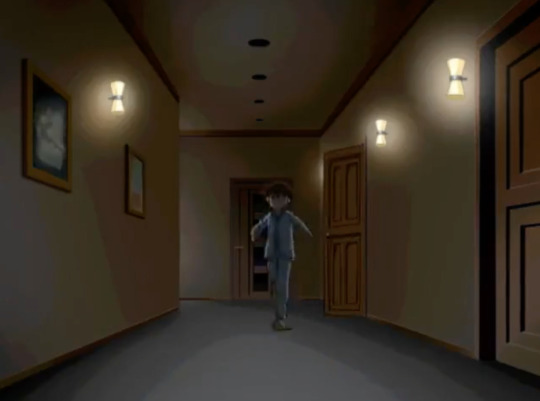
First the shot in the hall. There’s minimal lighting from a few wall lamps, the rest of the hallway is incredibly dark. Chris is shorter than the height of the lamps on the wall, his positioning keeps him small in the frame despite him running closer. He’s also centered in the hall, and when you look to the walls you can see several doors, implying several rooms, but only Chris is in the hall.

Then the stairwell– once again incredibly dark, but we see more of the grandiose nature of the house. A painting taller than Chris, a Grandfather Clock maybe twice his height. He also runs down the stairs with the railing up to his shoulder. It’s all finely detailed, which of course reflects the Thorndyke luxury they live in. But it’s still dark, and Chris is still so small.
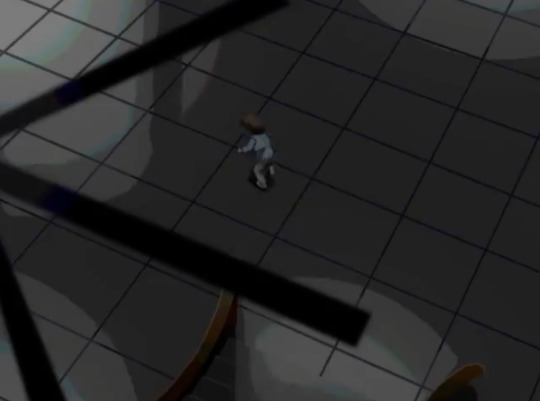
A shot of him running across the floor. It’s shot from above, and we see that the tiles on the floor are bigger than his whole body. This shot is even darker than the rest, only a few lights reflecting on the ground. The above-shot also shows a ceiling fan in front of us, which makes it look bigger than it is, also dwarfing Chris in the shot.
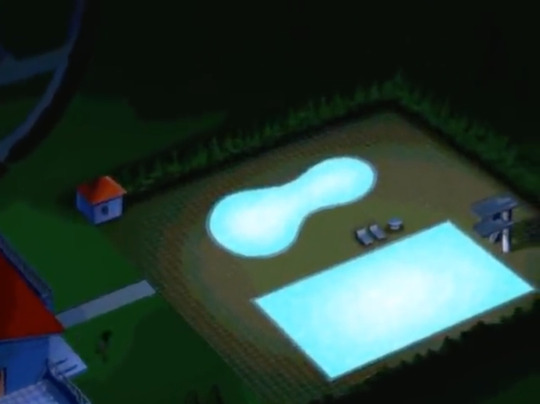
There’s a shot after that of Chris running to the pool– it is actually near-impossible to see him here, but if you look he runs off the back porch. Once again the world is huge, everything around him is huge, and everything is dark, except the pools. The pools where Sonic is, not that he knows that yet.
The pool still remains brightly lit as Chris dives in and saves Sonic. The first shot we see is him diving in, and then grabbing onto Sonic’s wrist. This is repeated multiple times later in the show as they reach for each other’s hands. It’s not only the first time we see this kid make contact with someone in the show, I’m pretty sure it’s the first time we see Sonic. In the first bit of the episode he’s only hitting robots, in the second bit he’s fleeing from everyone who comes near him. This first contact thus subconsciously establishes itself in the audience’s minds as important for both of them.

We finally see Chris clearly after he pulls Sonic out, where the two of them are lit by the pool’s light. Despite the long shadows coming off of them, they are both fully visible and sitting amongst the lit tiles, meaning Chris is now in the light.
This opening scene also establishes something important about Chris as well, and that’s that he’s... not a rich asshole. This kid woke up in the middle of the night, and for all intents and purposes saw nothing in the pool– he saw the ripples stilling, but that could’ve been anything. Could’ve been a frog. Could’ve been a bird taking off into the air. Could’ve been a bird shitting. But Chris still investigates anyway and immediately dives in, presumably once he sees something still in there. As he dives in, he also reaches for Sonic instantly, meaning it wasn’t just pure curiosity that drove him forward, but a deep desire to help whatever was in there. Likely he saw it moving and leapt in to save it without a second thought.
It’s established in the next episode that Chris knew full well he was not allowed to do this and it probably wouldn’t be safe; he’s not allowed to go outside at night or swim in the adult pool. Not to mention he’s also probably still half-asleep and wearing pajamas. Without hesitation he jumps in anyway because there’s something that needs his help. When he pulls Sonic out, he can clearly see this is a weird fucked-up thing he doesn’t recognize, but without even reacting to that fact he just asks if he’s okay. He only starts showing his surprise when Sonic begins talking. Even then there’s no screaming, he just introduces himself politely and then. Takes Sonic inside.
The next episode opens already in the next morning, and with Sonic still there we can assume Chris just hid him for the rest of the night without telling the other adults in the house. After Sonic mentioned people chasing him, Chris probably figured it wasn’t safe to tell anyone and took it upon his 12yo self to make sure this little guy didn’t get spotted.
Which, if it weren’t for Sonic’s impulsiveness, would’ve been incredibly easy.
The second episode opens with another panning shot of the huge mansion, with a voice overlay from Lindsey. The first thing we hear from Chris’s mother is that she’s sorry, but she won’t come home til “next week.” But she’ll send him a ton of gifts, so it’s okay!
Our next interesting shot is as she continues talking, and we see a ton of family photos tacked onto the wall. This immediately gives the impression of, of course, a family that really loves each other. It then immediately pans to Chris, alone on the balcony, talking minimally into a phone.
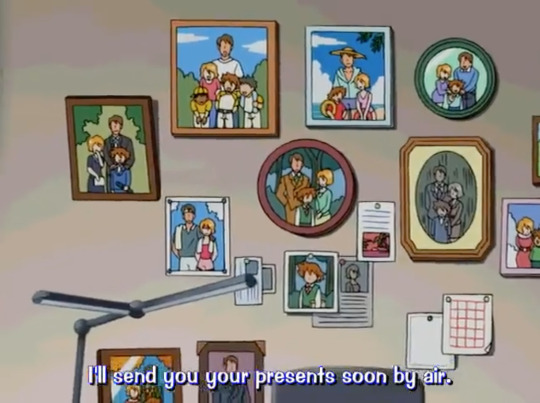
Chris then has another character beat of apologizing for diving in the pool. It seems like if he hadn’t mentioned it, nobody would’ve known, but he does anyway because he’s just like. A good little kid. Either that or it’s anything to keep his mom on the line longer.
Another thing to note is that Tanaka briefly enters during this scene, but doesn’t even look at Chris as he drops his food off and leaves.
When she hangs up, we hear a little kissing noise, and then Chris kisses the phone receiver and rubs the back of his head. His expression doesn’t seem embarrassed, though, especially as he didn’t notice Sonic staring at him until the next shot. He looks perhaps relieved, a soft kind of happy, perhaps at the compliment she gave him immediately before her abrupt goodbye.
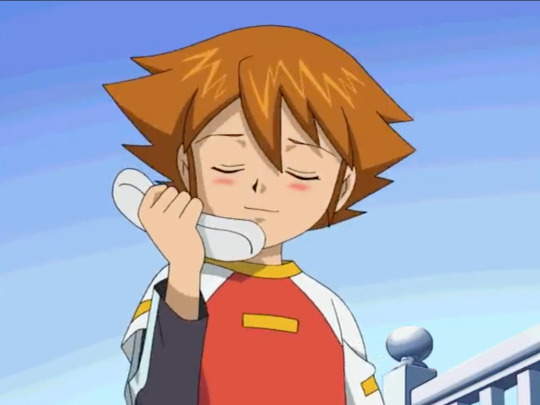
Sonic then asks why Chris referred to him as a cat; he doesn’t seem upset, just a little curious. Chris’s reaction is interesting here– the first thing he does is ask if Sonic is mad at him, and then immediately launch into an explanation.

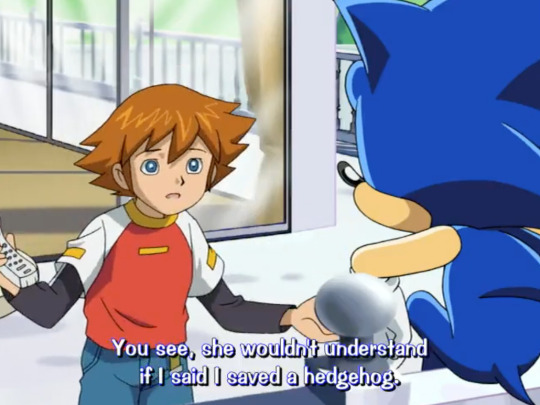
After Sonic seems calm, Chris then curiously asks Sonic where he learned to talk. They’re interrupted by the phone ringing, and Chris seems incredibly confused that it rung. He answers almost robotically, and immediately grows excited upon hearing it’s his dad, though his voice still indicates surprise. You can really hear it in the line delivery of his og actress, Sanae Kobayashi.
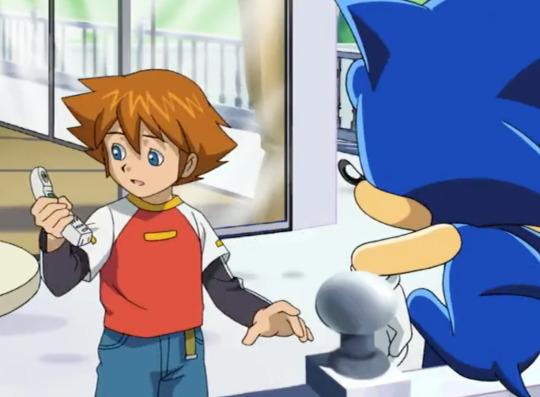

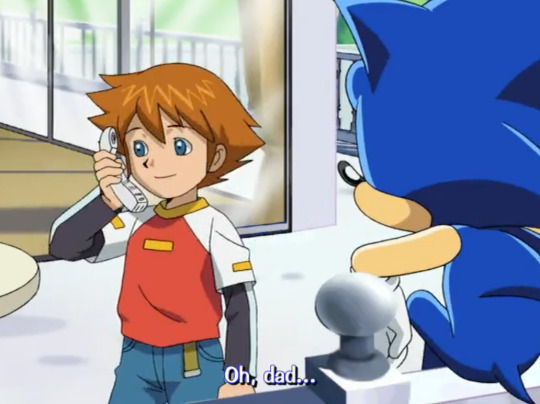
Chris continues smiling blankly as his Dad talks about how his mom told him that a cat got into the estate and maybe he should update security. Chris swiftly assures him that it’s okay, and then says, “But more importantly, you’re very busy, aren’t you?”

Basically he already knows that this conversation will be less than a minute long, but he’s still smiling until his dad’s already hung up.
The rest of the scene plays out as Chris googles what hedgehogs eat, tries to feed Sonic cat food, and then rightfully freaks out when Sonic leaves to get a chili dog, considering he’s a fugitive. And while his face and mannerisms at the end of the scene does effectively display this worry, they really do hold on that shot for a while as he fades back into a sadder expression.
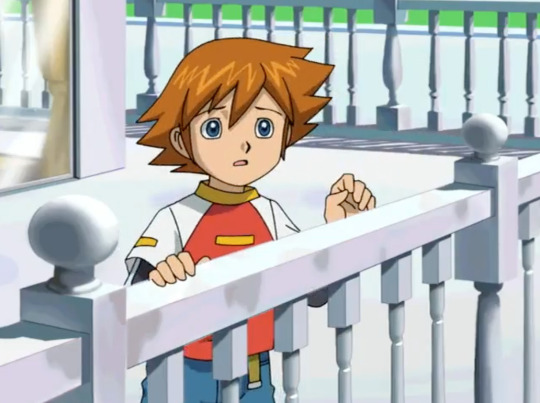
These scenes both serve as introductory scenes to Chris, and both visually and through dialogue, we have established:
Chris is constantly alone.
His world is dark until he finds Sonic.
He has a kind personality and doesn’t seem to be at all jaded or spoiled by his privileged upbringing.
His parents love him but are so absent that he doesn’t even bat an eye at the fact he won’t see his mom for a week. He is surprised when his Dad calls but immediately puts his work before his own well being.
He’s relatively calm, but only freaks out when he thinks Sonic might be mad at him, and when Sonic leaves.
I’d love to do a fucking scene-for-scene analysis of the entire show, but we’d be here for like twenty years so instead let’s uh. jump ahead a bit.
We slowly unravel Chris’s backstory and mental state throughout the first two seasons, in a slow way that I think is very effective and won’t be effective enough through this essay, but I’m gonna try my best.
Anyway, let’s jump ahead and cover his whole... thing.
Part II: The Backstory Scene that 4kidz Cut
The youngest we ever see Chris is in the season two penultimate episode. There’s a flashback to him as what seems to be a toddler, or just out of toddlerhood. This scene, right here, was cut in the English dub for... no real reason I can think of. In fact, it just makes Chris look less sympathetic.

The first shot we get is of Chris and his parents. Much like the Chris’s first scene, he is tiny, even tinier. But unlike that scene, everything is bright. It’s blinding, actually, as the doors are open and Chris’s parents stand in front of it. This is obviously from baby Chris’s perspective, representing his emotional state. With those doors open and his parents in front of him, he is covered in light. Covered.

His parents are quite formal in their parting words. “We’re leaving now,” his dad says. His mom then says, “I’m sorry, Chris. Make sure you behave until we return.”
Once again, I mentioned that this scene is from baby Chris’s perspective, so maybe they weren’t as formal when this actually happened. But that’s how it came across to Chris.
Sidenote, but honestly? Considering his age, this could very well be one of his earliest memories.
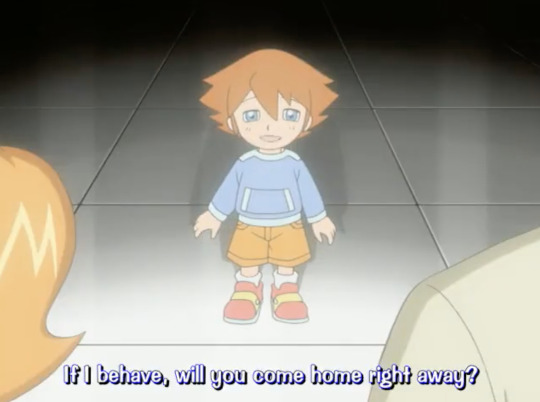
Little Chris says, “If I behave, will you come home right away?” While of course operating on little kid logic, this also reflects on how much he loves his family again, as all he wants is for his parents to be home with him.
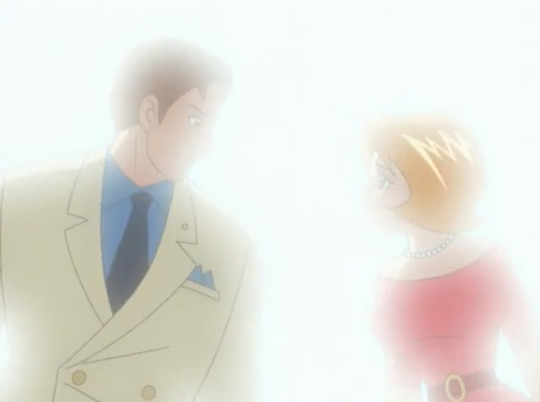

His parents look at each other, confused on how to answer. They then give the worst answer– “Of course.” We see how happy this makes him, but it’s only a temporary happiness. They’ve just made a promise they cannot keep and they know it, and at baby Chris’s age, he will NOT understand that.


When they turn to leave, Chris’s face falls. They once again have a formal goodbye, and as they leave, the doors shut, and the light is gone, and he stands there for again a long time. I don’t think I need to explain what this symbolizes.

The next shot, we see Chris is reading a picture book by himself on the couch. Once again a small little guy in a big world; the book also seems to be The Little Matchgirl, which... oof. The story is about how a lonely orphan dreams about having a family as she slowly freezes to death, in case you weren’t aware. The two shots we see from the book are first of her freezing, and then of her looking in a window and imagining a family. As Chris reads this, he repeats that if he behaves, his parents will come home.
He then hears the door about to open and immediately leaps up and smiles widely.
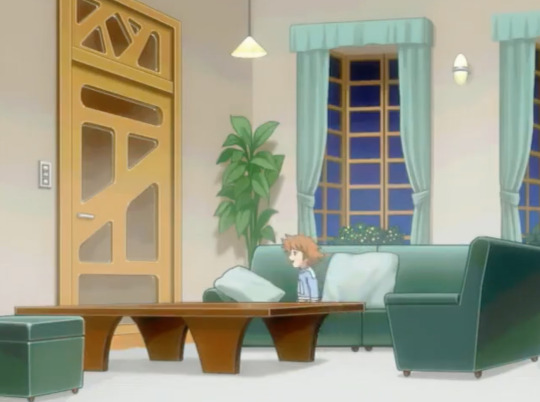
It’s not his parents, it’s Ella, but she has presents from his parents!
Despite being a little kid who would normally be ecstatic at the prospect of new toys, Chris just looks numb as she speaks.
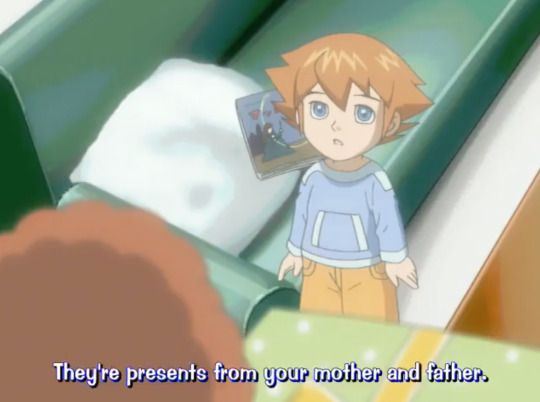
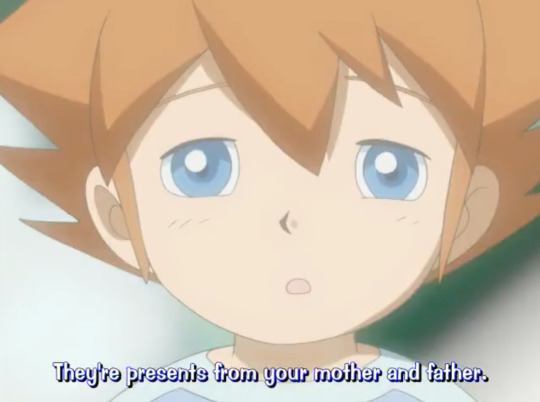
He takes no joy in the toy either, because his parents aren’t there with it.

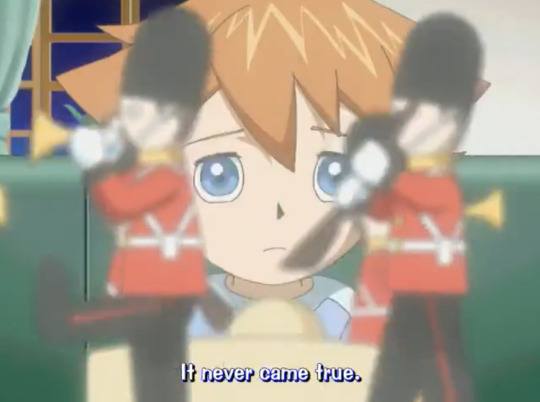
So. I have worked at a daycare and as a babysitter for about... seven years now. Kids? They have separation anxiety. They will sob and scream and shout and kick and run if their mom is out of their sight. I recently babysat a kid who learned how to unlock the door so he could try and run after his parents which was terrifying for me tbh.
Chris’s reaction of just immediately falling into a numb depression isn’t something I saw in the kids I watched. At this age, they cry at the very least. Chris doesn’t even do that, he’s just staring. We get one voiceover at the end of this scene, as Chris just says, “It never came true.” Obviously referring to the promise– he behaved, and his parents still stayed away.
What impression does this give a kid that age? One of two things, if not both at once:
I am not behaving enough and I need to behave perfectly.
Mom and Dad don’t care enough to come home.
From knowing Lindsey and Nelson, we know this is not true. They’re busy, and they hope to show their love through gifts. But Chris’s love language is very much not gifts, it’s quality time. And he doesn’t. Get that.
From anyone.
Part III: Chris’s Abandonment Issues
As I’ve made it clear, Chris’s parents are never around. He doesn’t bat an eye at his mother saying she’ll be gone another week, and is surprised that his Dad even bothered to call. We saw all those family photos, but looking at them again, how many of them were taken at the same time, one of the few times his parents were home? How many is Chris standing stiffly, properly, instead of relaxing like a kid?
Another line from episode six really drives his home, one I think a lot of people miss.

Upon being told his parents are coming home, Chris remarks that it has been months since he’s seen them. Months.
Later in the episode, Chuck remarks on how it’s a miracle to see them both at the house at the same time. They laugh this off, and spend the rest of the episode anxiously waiting for Chris to get home because, yeah, they do care. When Chris gets home he immediately calls for them and gets tackle-hugged. As they do, he stiffens upon the physical contact, and looks awkward the whole time, like he’s not used to physical affection.
He’s then later surprised to hear his parents were worried he was late.

The next episode, Chris’s dad has already left by the next morning. When he hears his mom has unexpectedly left, he is upset, but not surprised; he immediately resigns himself to this and sighs before leaning back on the couch.
When he brings this up to his uncle, Sam immediately remarks that his sister is never home.
This is where Cream breaks, because she has seen Lindsey herself break down over not being there for Chris. Chris has not seen that. All he knows is that his mother was there and then was gone, despite their elaborate dinner plan, despite knowing he was bringing a guest to meet her.
Once again, he’s not surprised. Neither is Sam.
Similar with his Dad; in the previous episode, when they were worried, Nelson implies that he has a guard service making sure Chris doesn’t get abducted. They’re two seconds away from calling the US Military to find him. But they stop short of going after him, because they don’t want him to think they’re being overbearing.
We’ve firmly established this by now, okay? His parents are never home and haven’t been since he was, what? Three? Four, tops.
Nobody else was really there, either.
Ella and Tanaka seem to have done most of Chris’s raising. And while Ella and Tanaka are amazing, and definitely care a lot about Chris, it doesn’t change the fact that they are paid employees and Chris knows this. They’re paid to hang out with him. If they weren’t getting paid, Chris has no idea if they would even give a shit about him. Even with that, there’s not a ton of evidence they like. hung out with him outside of making sure he was alright. As mentioned, in the second episode Tanaka doesn’t even look at him as he delivers food. Not for lack of care, but probably because they’re busy as only two servants in a huge estate. This isn’t their kid, too, they’re under no obligation to raise him. Ella is the cook and Tanaka is the butler-bodyguard, they’re not childcare experts.
What about his grandpa? Sorry to break this to you but Chuck wasn’t around, either.
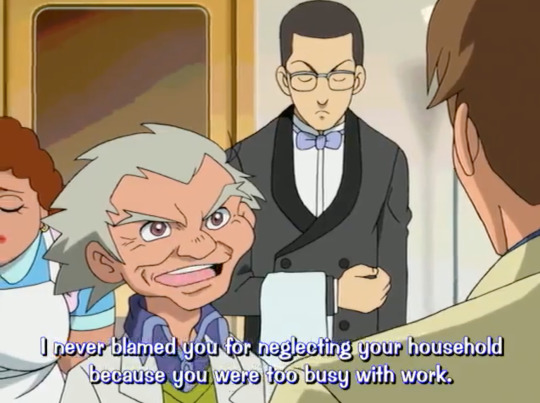
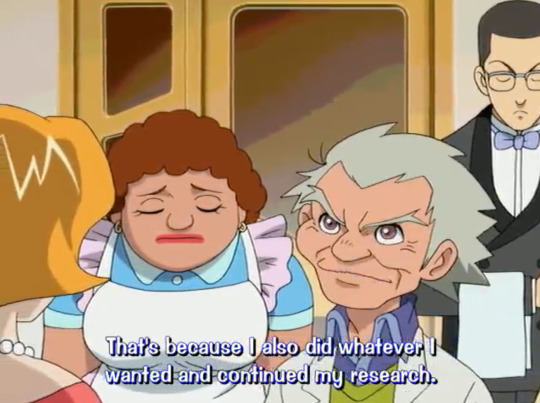
In episode 51, which we’re gonna keep coming back to as it’s the culmination of Chris’s arc, Chuck says this while reprimanding Nelson and Lindsey. He says, “I never blamed you for neglecting your household because you were too busy with work. That’s because I also did whatever I wanted and continued my research.”
Back to the second episode, when we first see Chuck, you notice on the second watch that Chris 1) doesn’t trust his grandpa enough to tell him that he’s hiding a fugitive in their house, 2) didn’t seem to expect him (or ANYONE) to walk in on them in the LIVING ROOM, 3) seems to not know a ton about his personality. He’s surprised when his grandpa closes the door on Sonic, and surprised that he’s a bit of an adrenaline junkie. It seems that instead of spending time with his grandson, Chuck spent most of his time in his shed tinkering with machines.
His uncle? Seems to visit on occasion, but has a government job. You know he’s never around, either.
So Chris is growing up in a huge house, which is serving to give him a constant reminder that nobody’s home. There are two servants going around working and sometimes saying hi to him, there’s a grandpa in the shed somewhere who might come in once or twice to watch TV, and there’s photos on the wall of parents who aren’t home. He’s like that for at least eight years.
OH, and let’s talk about the friends argument which I’ve confusingly seen. He’s got two friends at school. His parents seem to recognize Danny’s name, so Danny might have been a longtime friend, or at least friend he talked about before. But Danny and Frances, being barely in any episodes, we can assume they also have their own lives and things going on and thus don’t, like, hang out with Chris after school a lot. He uses Danny as an excuse for being late in ep6, but the fact that nobody seemed to expect him to be late implies this is not a usual thing. And of course it is ABSO-FUCKING-LUTELY not on the shoulders of these other 12yos to emotionally support another kid, but it’s not like they’re immediately moving into his house and giving him attention 24/7. They’re friends. Which is all they need to be. But for a neglected child like Chris, they’re just another part of his life that comes and goes. Him having two buddies at school that he shares a table with (thus probably just. friends by proximity) doesn’t negate the neglect.
Looking at the photos on the wall again, there’s one photo of Chris with some kind of sports team, probably baseball. Considering how bad Chris played in the baseball episode, he probably didn’t stay there long, and considering we never see anyone even resembling the kids in that pic, we can assume they didn’t stay long-lasting friends. The other photos, they’re dressed in suits, like they’re taking professional photos. Once again stilted, stiff.
But I hear y’all on twitter now. “Oh, boo-hoo, his parents weren’t around. He was still living fancy, it’s fine.”
So let’s talk about the effects of emotional neglect on the childhood psyche.
Part IV: Connie Read Actual Research Papers and Scholarly Articles For This Instead of Doing Actual Work
So, here’s something that’s been seen recurrently in neglected children: kids are psychologically dependent on parents or caregivers throughout their whole childhood and adolescence.
From New Directions in Child Abuse and Neglect Research by the Committee on Child Maltreatment Research, “Children who have experienced abuse and neglect are therefor at increased risk for a number of problematic developmental, health, and mental health outcomes, including learning problems, problems relating to peers, externalizing symptoms [aggression or conduct disorder], and posttraumatic stress disorder. As adults, these children continue to show increased risk for psychiatric disorders, substance use, serious medical illnesses, and lower economic productivity.”
Let’s talk mainly about the mental health outcomes. Without a present caregiver, neglected children often fall behind on the abilities to regulate behavior or emotions. Several parts of the brain will end up altered due to early childhood neglect, including the stress response system, the emotion processing and regulation system, the learning and memory system, etc.
The stress response system is the hypothalamic-pituitary-adrenocortial axis, aka the HPA. The HPA is incredibly sensitive to early childhood experiences and an uncertain childhood can effect a lot of things, such as sleep patterns and hyperactivity. Abused children will often have higher spikes of cortisol, a high enough number of which can cause damage to the brain and premature aging.
The behavioral regulation is also most commonly affected in these victims; neglected children will often show “behavioral and emotional difficulties that are consistent with effects on the amygdala, such as internalizing problems, heightened anxiety, and emotional reactivity, and deficits in emotional processing.”
Other mental health issues are also seen; children with trauma experiences will show similar mental patterns as those with ADHD, and can have serious issues with inhibitory control– aka, controlling your impulses.
Then there’s the corpus callosum. (Insert SnapCube dub joke here.) The corpus callosum manages communication between the two hemispheres of the brain. Several studies have found that abused children have a much smaller corpus callosum than non-abused children, even those who are mentally ill; these effects are also more pronounced in boys than girls, which is relevant to our analysis of a 12yo anime boy from 2003. This means that their brain development will often be behind that of their peers, and it could take a while for them to mature.
That was long and boring Connie. Give us the tldr.
Okay don’t worry, the article got to that right about now. Children dealing with neglect will show several issues related to the interrupted development of these parts of their brain, including:
Extreme Deficits in Executive Functioning
Difficulty in regulating attention: As a note on this, 18.6% of abused and neglected teens are diagnosed with ADHD. Compared to 5% of other children. That’s like three times the amount!
And, most interestingly, the behavioral outcomes:
Difficulty forming trusting attachments to caregivers
Both Disorganized and Insecure Attachment Issues, usually getting severe Attachment Disorders
Reactive Attachment Disorder: Inhibited or emotionally withdrawn behavior, rarely seeking or responding to comfort
Disinhibited Social Engagement Disorder: Basically the opposite; it’s marked by a pattern of overly familiar behavior with strangers.
Emotion Regulation: infants learn how to deal with distress via their parents– how their caregivers handle stress, how they take care of problems and slowly introduce the ability to deal with them. Without that, abused and neglected children will often fail to develop effective strategies for regulating emotions. This will probably cause a lot of the following.
This also includes recognizing emotions in others. While abused children will identify anger quickly, neglected children tend to be worse than non-neglected children at identifying any facial expressions.
Their emotional issues can also cause them to feel isolated from their peers, as their peers do not understand them and do not act like them.
Anxiety
Depression– nearly a 3x chance compared to non-neglected kids
Dissociation
Conduct Disorder
PTSD
Physical issues include stunted growth and motor development, and lower health.
Note that these do not appear in all victims of neglect, these are just common symptoms.
Part V: Every “Annoying” Thing Chris Does is a Fucking Symptom
Difficulty forming attachments to Caregivers
In episode 43, Chris deals with a situation that’s obviously alien to him: his parents coming home to care about him.
His parents hear that he’s sick and drop everything to come home. This is clearly something that’s unusual, judging from both Chris’s and his grandpa’s reactions to it. Chris is confused and embarrassed, kinda numb and still, until his grandfather and father start arguing. Even then, he only reacts when they bring up Sonic.



He then yells that he hates his family and orders them to leave him alone. This doesn’t last long as they’re immediately attacked by more badniks, but it’s a beat they definitely put in there intentionally.
Also, he doesn’t seem to trust Chuck as an authority either. He really just sees him as an impulsive adrenaline junkie at best; in the cruise ship episode, Chuck is drunk the whole time and Chris doesn’t seem to care. It also says something that while Ella and Tanaka are present, he doesn’t trust them to tell them they might be finding an alien in the attic until they find out for themselves.
Difficulty Understanding Others’ Emotions
This one’s gonna be easy, as I talked about it earlier in the essay. When Sonic asks, “Was the cat supposed to be me?” Chris immediately assumes he’s upset and tries to placate him with an explanation. This happens throughout the show as well; let’s take Mr. Stewart for example, that man is obviously spying on him and inserting himself into his life and Chris thinks it’s maybe a little weird, not that much though. He also spends most of his time hanging out with Shadow standing there in complete obliviousness as to what Shadow is thinking or feeling. He doesn’t even seem to really register Shadow as a threat, instead throwing himself at him in hopes that he can convince him to help Sonic. In doing so, he also doesn’t think that Tanaka would at all be worried about him, and is surprised at their reunion that Tanaka was upset.
Aggression / Delinquincy
This was very underplayed, but in the Sonic Battle arc, we literally see him start to rebel. He tells Sonic that he’s sick of being the perfect rich kid, that he wants to be a problem on purpose sometimes. Sonic seems to completely understand that, as that’s a point Chris needs to reach. He has to realize he cannot be perfect and that’s okay.
[except that dialogue was all cut in the 4kidz version no im not bitter]
Only Chris explores his imperfection in a really bad way.
And now. Let’s get into the attachment.
And to do that, we need to get into...
Part VI: What Sonic Represents
This is a fascinating part of Chris’s psyche since I think it occurs both subconsciously and consciously, but when I drew attention to Sonic bringing the light back into Chris’s life? Yeah, that’s cause he did.
Everything changed only after Sonic arrived. Suddenly Chris’s parents are... visiting??? For once??? TOGETHER??? His grandfather wants to spend time with him! His friends at school are hanging out with him more and he’s even made new friends! And most importantly, he has the mobians around him constantly. He’s got constant attention from all of them, and while he quickly takes on the figure of the Responsible One, he’s still WITH PEOPLE. He’s gone from being alone all the time to surrounded by a rowdy-ass found family.
Most of all is Sonic. Chris seems to have attached himself mainly to Sonic, likely because in his mind Sonic represents the moment when everything changed. Of course, Sonic would probably have been the worst of the gang to get attached to, seeing as he runs off all the time. The first several episodes, even after they stop hiding from the public, Chris is noticeably upset whenever Sonic leaves. He only calms down after several, several episodes, after assurances from every character that this is just a thing Sonic does, he never sticks around anyway, don’t worry about it.
But still, he definitely attaches himself to this hedgehog for better or for worse.
And it gets worse.
Part VII: Even More Trauma
First we gotta talk about the end of Season One.
At the beginning of the arc, Chris is noticeably... incredibly depressed. He’s also disassociating hardcore. He’s constantly staring into nothing, his face upset, but as soon as someone snaps him back to reality, he forces a smile on his face, acting happy despite going through a ton of negative emotions at once. Almost like he’s trying to behave perfectly.
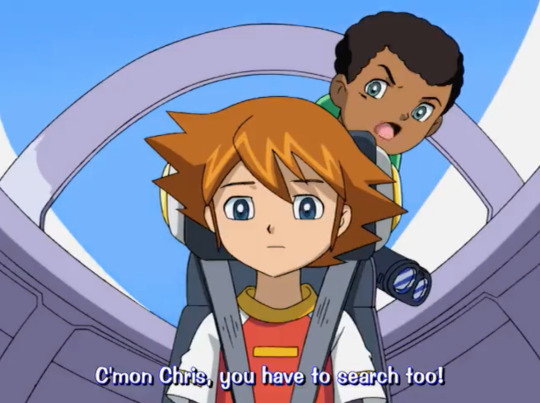
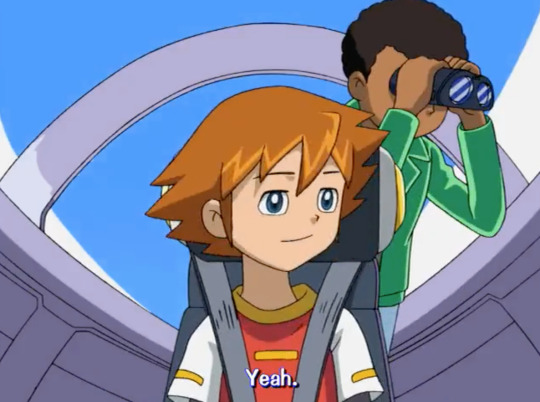
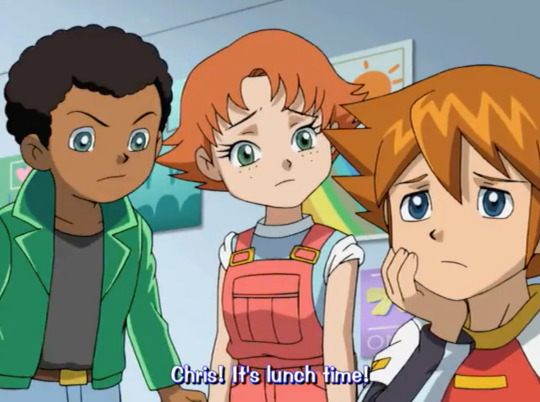
Chris realizes throughout the episode the attachment he’s gotten to the mobians, and especially Sonic, but even then he still does his best to help them. He steals a chaos emerald and runs off to Eggman in order to get them home, because it will make them happy! Nevermind if it doesn’t make Chris happy. He’s never worried about that anyway.
Of course this backfires and Eggman kidnaps him, and then Chris has to go through the serious trauma of. Well. Being strapped to a wall, forced to watch helplessly as Sonic fucking dies.
And he’s blaming himself for it too.
MAJOR shoutout to Kobayashi’s acting in this scene, holy crap. But he just screams, and then... BREAKS THROUGH METAL?? And GRABS the Chaos Emeralds despite them ELECTRIC SHOCKING HIM???
And then of course we get this incredibly subtle dialogue.


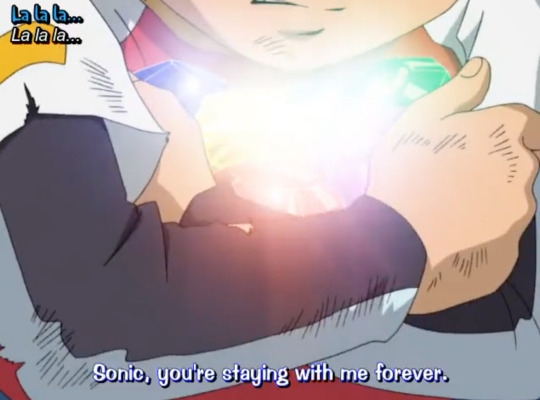
"I will not let you have it. I will not let anyone have it. They’re only mine. Only me. Sonic... Sonic, you’re staying with me forever.”
Immediately after this, Chris almost fucking dies, and is only saved by Super Sonic. When he sees Super Sonic, he reacts by... begging. He drops down, clinging to Sonic and screaming and crying that he is nothing without Sonic.
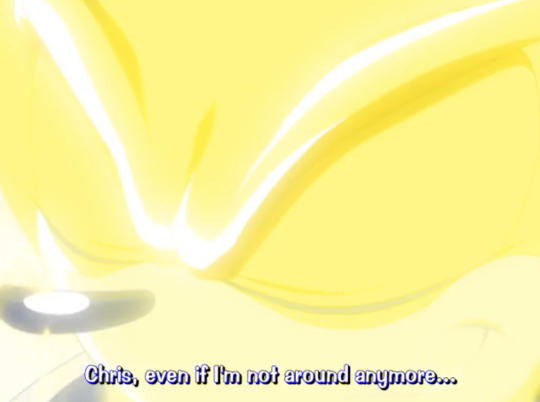
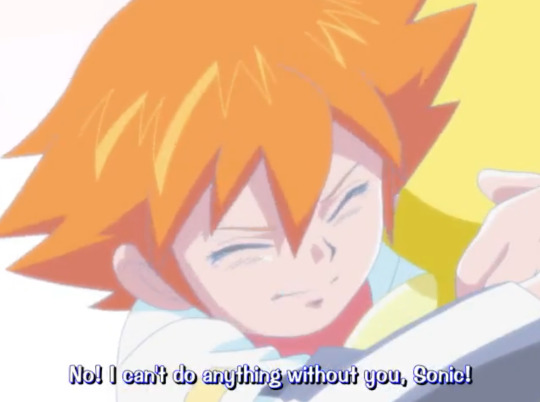
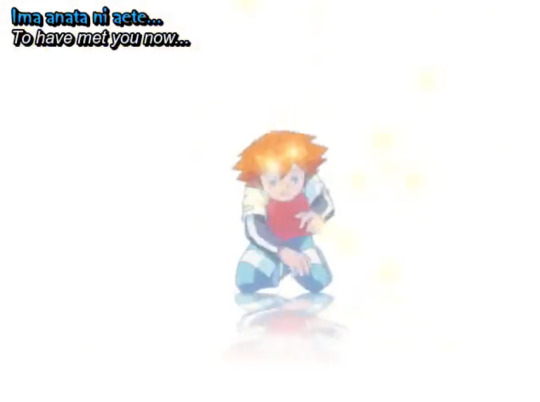
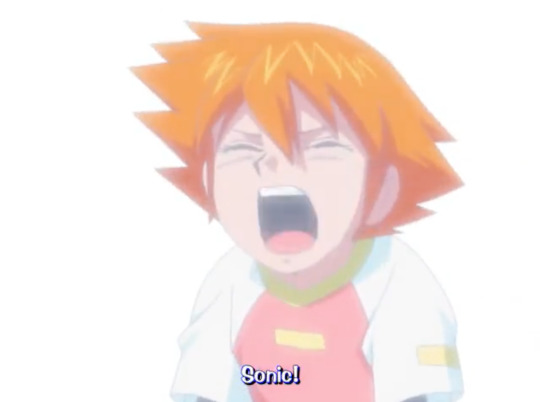
Chris literally yells that he can’t do anything without Sonic, because that’s how he felt before Sonic. He could not do anything to get anyone to care about him, it only happened when Sonic arrived. So that’s how he sees himself: useless, worthless.
Sonic of course stays, but then dips for six months. When he gets back, a fucking god attacks Chris’s neighborhood, destroying his city. He gets sent away for a month, but that’s interrupted by Sonic being declared a fugitive from the government. Then Chris ends up with Shadow. He gets kidnapped by the goth clone of his emotional support hedgehog. He bonds with the goth clone. He gets the shit beaten out of him begging the goth clone to help save the world. It works, and Shadow runs off to save the planet. And then DIES.
You can tell how traumatized Chris is by this in the next episode. He’s disassociating again, staring at nothing, and eventually asks his uncle if he thinks they can actually live in the same world.
Which is followed by...
Part VIII: The Season Two Finale
We get the rather worrying scene of Chris having to write an essay for his school about his ideal future. Literally all he can think of is that he wants to stay with Sonic forever. He has no other ideals for the future. Just being attached to Sonic.
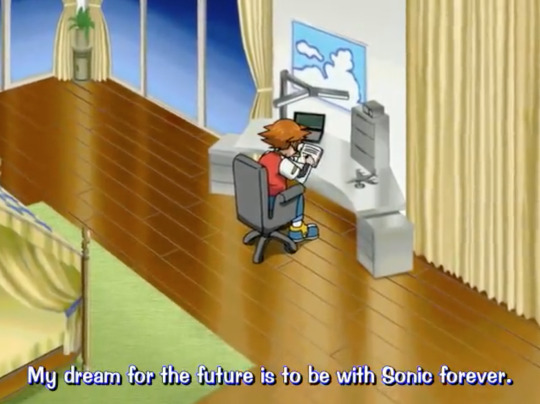
Only to go downstairs and find out that Sonic HAS to leave. They ALL have to leave. Their dimensions are caving in on themselves and they need to separate.
So he enters the Denial stage of grief.
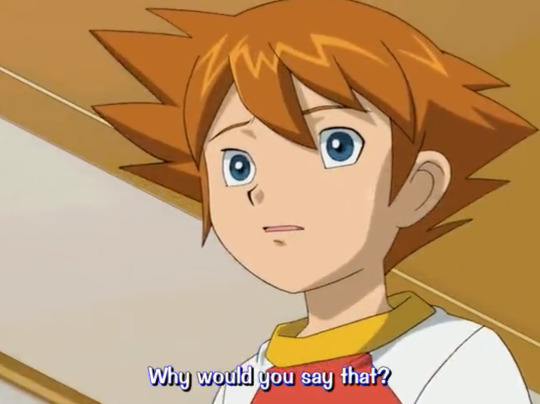
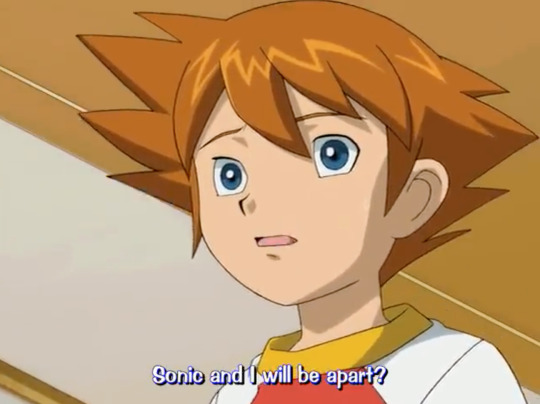
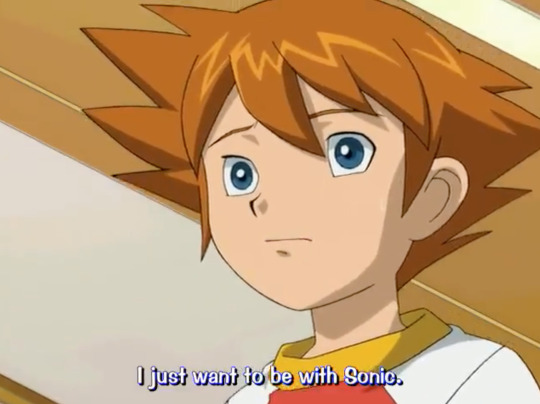
He seems... dazed. Like he’s in a trance, as he argues that Sonic can’t leave, that all he wants to do is be with Sonic, that he can’t be apart from Sonic because he’s only been able to do things since Sonic got here. This was the first time he’s had agency in his life and he places it all on Sonic.
He decides that it must be Eggman’s fault and literally tracks him down. When he finds out that it’s not Eggman’s fault, he is distraught, and what’s interesting to me is that Eggman seems to get it. He just tells his robots to let him go. Let him be alone. Let him accept it.
Chris then falls back into the depression/disassociation during the entire farewell. He doesn’t emote, he just stares ahead. Something they cut in the English version is that while Chris is politely saying goodbye, throughout the whole scene you can hear his inner monologue screaming. Crying not to let them leave.
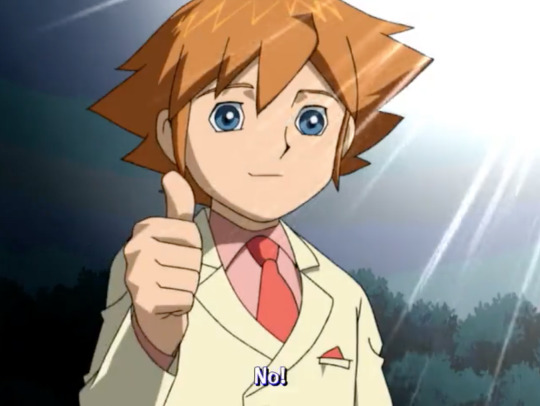
So he doesn’t.
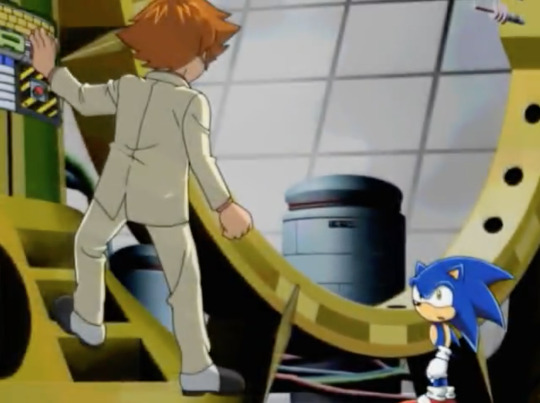
The penultimate episode of Season Two is the culmination of Chris’s arc and they do it so beautifully.
Sonic knows Chris is going through a breakdown, and he lets him figure it out for himself. He lets him run off with him, he lets him make the decisions about where they go. Chris starts to realize this but says nothing. They see his tearful parents on TV begging him to come home and he... groans and leaves.
The episode also subtley shows Chris doing things himself. Climbing up the mountain, picking their roads. Sonic is slowly trying to let Chris know he has his own agency. That he is his own person.
They get to the campsite that meant a lot to Chris in his childhood, one of the only times that his parents hung out with him, and he breaks. Asks Sonic why he doesn’t hate him. Why he hangs out with him. If he only hangs out with him out of obligation.
And he comes to the conclusion himself that no, he can’t keep Sonic here. He can’t keep Sonic away from his world just because he has attachment issues. It was what he knew was right in Season One but couldn’t get himself to understand no matter how hard he tried. But now he gets it. And now he can let Sonic go.
The episode is soooo good, sooo fucking good. And then in the season finale, when we see the aftermath of that, when Sonic takes him on one last run and... he sees Sonic crying? Realizes that Sonic does love him and still lets him go? It’s impactful. It’s emotional.
Then when his parents come get him and he just smiles? Because he realizes they did come for him? That if Sonic can love him without obligation, maybe other people do too?
Chris’s severe attachment issues and trauma from being neglected culminated in this episode, and he made a bad choice. And then he made the right one. And that’s so good.
Part IX: Some Season Three Notes
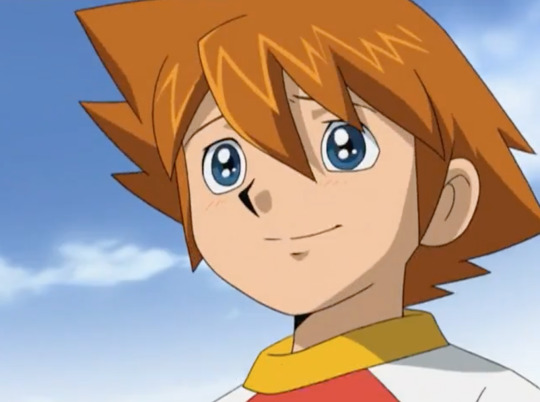
Chris’s inclusion in the third season was... weird. It felt like they didn’t want to animate his adult model so they shoved him into a child body and made an excuse for it. But honestly, after traveling there, you can kinda... tell how much Chris has grown.
He was trying to get back to Sonic, but not because he needed him, but because they were friends. He and his friends wanted to see their friends again. He only went alone because he had a sense Sonic was in danger. And even in the twelve-year-old body, he’s an adult now and he acts like it. His only real emotional issue is that he is upset he can’t fight as well in his kid body, but then he figures out he can be useful with his inventions and finds a place with Tails. He’s basically parenting the rest of them for the rest of the season, telling Cosmo that her impulsiveness reminds him of his younger self. He offers to give up a way to return home because he knows the Metarex problem is bigger than himself.
At the end, when Eggman offers him a way home, you can tell they expected him to freak out about it. They’re shocked when he just says thank you, cries, and leaves immediately. They clearly not only will miss him, but they expected him to freak out like he did at the age of twelve. But he’s not twelve anymore. He’s spent the last six years surrounded by people who love him, healing from his trauma, and becoming his own person. So now he isn’t unhealthily attached to Sonic, and he can say goodbye if he has to. That growth, so subtly in the background of the season, really impressed me.
Part X: Fandom Reaction
On June 24 2022, I posted this meme to both twitter and tumblr.
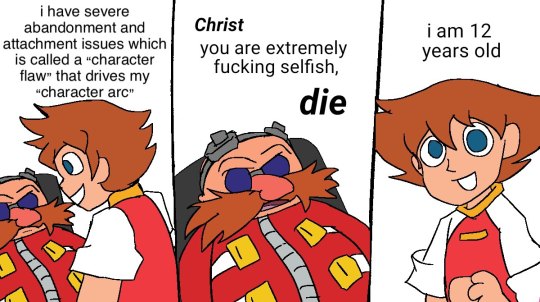
On tumblr I got no pushback and a few agreements. On twitter I got a tidal wave of discourse, which tells you a lot about the two sites but regardless, this is the first time I get to ratio my commenters cause as of today, it has 23.4k likes and only 161 replies and 156 quote tweets. So that’s barely over 300 people (TOPS, considering several replies were positive) arguing against 23,400. So I may not be the only one thinking this!
But even still, with this being my most viral post atm, I got so many people bitching about Chris still. Even after all these years, he’s despised for being so annoying. And what is it? Is it really the fact that he got main charactered over Sonic? Really, I thought that was a plus of the show, that Sonic was a static figure that influenced what was around him. It doesn’t work for every Sonic property, but it did for this one. Was it just a hatred for humans in the franchise? Probably not, everyone loved Helen and the recent movies.
I really do think a vast majority of it is his realistic reaction to the trauma of neglect. “Ugly” trauma symptoms, like attachment issues, impulsive destructive behavior, aggressiveness, and selfishness, they are not looked upon kindly. Just look at how TikTok picks and chooses cute parts of mental illnesses and calls the rest “toxic.” And yes, sometimes mental illness can cause you to be toxic! And sometimes you’re just mentally ill! Sometimes you just have bad days and bad decisions and horrible mental states, and sometimes, life gets better. Sometimes life gets better and you begin to heal, and that’s what Chris’s arc was about, about him slowly gaining his own agency and starting to heal from his abandonment trauma. And he does this through the help of others. But with him having several moments where he reverts, several moments where his healing is non-linear, viewers see it as an annoying personality trait, not a trauma symptom he is trying to overcome. And one that he does. I cannot emphasize enough that he does overcome this and that the narrative specifically focuses on it. I’ve seen so many people say it was a writing flaw, that they never criticized Chris for his attachment to Sonic... it’s the focus of two season finales, what are you talking about? I think at that point, it’s just you.
Just think about why you find him annoying. You do not have to like Chris as a character but please recognize that his arc is a realistic portrayal of a neglected child and that’s why he is the way he is.
Part XI: Conclusion
I was gonna write a full-ass conclusion here but tumblr’s already trying to kill me over wordcount so uh. tl;dr Chris isn’t annoying he’s a traumatized child and this is something the narrative notices, examines, and resolves. What this means is that it’s not a writing problem, it’s a character flaw brought on by trauma that his character arc makes him heal from.
Leave him alone.
1K notes
·
View notes
Note
Absolutely agree with your post. My friend once told me something like “it’s interesting to see how there are a lot of narratives within dick grayson’s stories that can be read as metaphors of rejection of someone’s autonomy—which is many times it happens towards/explored in female characters, e.g the robin mantle being ‘ripped away’ from him without his consent, his should have been ‘fate’ as talon, a tool for CoO” and when you add it with his canonical SA and the many times he gets objectified, another thing that media throughout the times write happened to/explored in female characters, it further cements the point of him occupying the (traditional) female character role.
OG post in reference
Thank you!!! Those are all excellent points to bring up!
You guys did a fantastic job of identifying core examples of where Dick is written for the female role. Every time I read him, I'm amazed time and time again how beautifully DC has written him. He's undeniably written as a man but he's unique in the way his characteristics overwhelmingly reflect typical female personality traits and his entire life story is written as if he were a woman. The relationships he has with people, he always subtly ends up in the female role.
Take the scene of him being objectified -

JLA/Titans Issue #3
This is exactly what it's like to be catcalled.
It's humiliating, uncomfortable, and scary. It needs to be addressed.
But here's where I oppose fandom's view on this. Fandom basically blames DC for scenarios like this where Dick is being harassed by other characters for his beauty or suggesting that Dick somehow encourages this behavior, but I think we should restructure our outlook.
Dick being objectified should be considered as one of his trauma's like his SA is. Like the way Jason death affected him, Stephanie's death affected her, or the way Tim's depression did him, Dick's constant sexual objectification should be analyzed as part of canon problem because it's relates to once again to how women feel in these exact situations. Note the way he is uncomfortable - the writers know what they're doing. They know it's wrong and if they're bringing up his reluctance time and time again, then this should be explored not as a fault of DC but as a problem he's forced to face.
DC uses Dick as a soundboard to broadcast the issues women face in a way that wouldn't be as problematic as if they did with other major female characters. Because doing such things to female characters is a little too political for a comic book and a corporate company so they take liberties through Dick instead. Some of the times they've written him seem intentional and other times it seems unintentional, but even with the way the later is written, it's because they're following Dick's standard characterization which was written to be the balance between men and women.
Another major, MAJOR point you bring up is autonomy.
Autonomy is the essence of his character.
Quick definition: autonomy is the right to self-govern. This means you're in control of your own actions, beliefs, and HERE IT IS - Freedom to do what you wish to.
From the moment Dick and Bruce started fighting, the problem with their relationship boiled down to one thing and one thing only. Freedom.
Given my other Bruce and Dick posts, I've mentioned how Bruce felt an increasing need for control over Dick while Dick felt increasingly furious at his freedom being taken away.
Even Azrael when he lost it for a moment. Batman!Dick
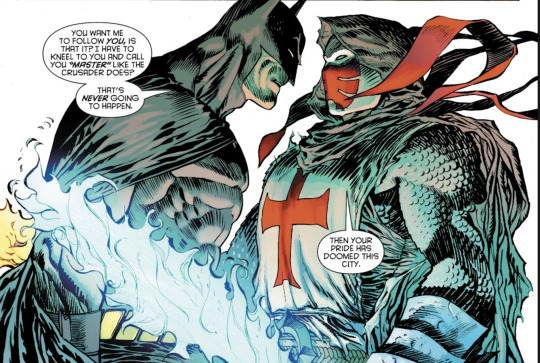
Batman (1940) Issue #709
Another point: For Bruce, all his enemies want him to break. They want him to turn evil but for Dick's, his enemies always want to him to follow them.
Yet the fact that Dick faces all this and continually fights this - he's girlbossing so hard.
That's why I like Dick so much. He breaks the gender roles. Because breaking gender roles isn't just painting your nails pink and saying you respect women. No. It means playing the traditional role of men and women both.
A man's typical role is strength, power, and competitiveness.
A woman's typical role is vulnerability, empathy, and intutition.
But Dick? Dick is one of the strongest fighters in all of DC, he's considered the best leader, and he's so brilliant he always wins his fights. But at the same time, he cries when he's heartbroken. He cares for children that aren't his own and citizens he doesn't know. He anticipates the emotions of his family and friends and loves them for who they are.
That's also a core difference between Bruce's treatment of the batfamily vs Dick's. Where Bruce rages at their disobedience and differences, Dick accepts them and encourages them. Another why Bruce is viewed as the father role of the family while Dick is viewed in the mother context. Evidence of this is pretty clear in Red Robin Issues #23 - 26 with the way Dick treats Tim vs the way Bruce treats him.
DC made Dick pretty on purpose and they wrote him like a woman on purpose while building him up as a man.
I'll iterate agin, he was built to fight male toxic masculinity and we should be looking at him through those lens. He's a complex, deep character that was meant to break gender roles by embodying both male and female characteristics and that's beauty of him.
#dick grayson#nightwing#bruce wayne#batman#azrael#batfamily#thanks for the ask!#cl anon asks#cl asks
314 notes
·
View notes
Text
remus isn't dumb; a sanders sides essay
i've been struggling to make a cohesive post about this because i feel like most of what i want to say boils down to the same underlying message which is: remus isn't dumb.
i feel like a good chunk of this fandom understands what i mean, at least to a surface level point. but even then, i think too much of the fandom still misinterprets remus' character in a way that, they seem to understand different traits of his, but the way they execute it is still way off from what we see in canon.
(rest of the essay under the cut!)
for example, the biggest thing i see people get wrong would be the way they write remus "lol random" personality. it's true that remus tends to say whatever he wants at any given moment. but, the problem here is that people tend to think remus as random in function. i have no better way to describe this succinctly, so to expound: while remus tends to make left-field jokes a lot, he is shown to be incredibly deliberate, cunning, committed, and intelligent in very subtle ways.
truth is, remus is very goal-oriented, and when he has a goal, oh he strives for that goal. so far, i'm writing this with the last 5 years episode being the most recent substantial episode, so i can't really 100% say all my assumptions of remus are true. actually, i think the upcoming season finale will be the missing link when it comes to providing us with the whole picture of who remus is.
as for now, i just have to stick with my theory of; remus, as a side of thomas' heavily connected to insecurities and mental health issues, intends to shed light on the "darker" sides of thomas because he believes them to be beneficial. throughout dwit, we see remus continuously bolster the idea that his contributions are useful for thomas. this continues in wtit, but with the extra layer of remus wanting logan as well to be in touch with the darker parts of himself to get thomas in line.
it is also heavily implied that remus is well in on whatever janus' plan is to get thomas to be a.) more aware of his mental health issues, and b.) to get thomas to break out of his catholic black and white thinking. in forbidden fruit, it's janus who’s seen permitting remus to present himself to thomas. bigger evidence though, as i've mentioned in the previous paragraph, is the way remus seems to deliberately want logan to manifest his anger against thomas.
of course, we can always say that remus taunted logan "just for fun", but i feel like too much of what happened in wtit seem to point to remus having deeper reasons. for example, wtit exhibits how bad thomas' mental health is to the point that he gets irrationally angry at nico for not replying to his texts. this proves how thomas has been neglecting his mental health, and with the way patton, virgil, and roman held onto toxic selfless ideologies for the longest time, thomas would still, naturally, be lost on what to do. he would even seem to deny how bad things have gotten, especially with the way he acts like nothing bad is happening when he goes to his date with nico.
why am i emphasizing this? well, it's because something i find interesting about remus' character is how deeply cognizant he is of thomas' problems. what i mean by this is, no other side can call out thomas' issues more than remus can. i wrote an essay about this before if you want to check this out, but tldr: remus, as intrusive thoughts, is the most perceptive out of all the sides when it comes to calling out insecurities or problems. we see this come to fruition in wtit when all of the traps he laid out for thomas involved nico in some capacity.
while you can interpret his character as evil for preying on others’ insecurities, i think it's important to acknowledge that, in a sea of people who tend to refuse to talk about their issues, remus is the main guy who constantly brings them to the table. whether remus' intentions are good or not, there's no denying that remus' importance as a side lies in the fact that he serves as a mental health alarm clock for thomas. with the way none of the sides want to communicate with each other, we need someone like remus to cut the bullshit and say things as it is.
again, we don't really know if he wants to help thomas. but i would like to emphasize that, yes, remus is not dumb. he does not merely make lewd jokes and calls it a day. he has the long-term goal of making everyone talk about more "taboo" topics with each other, and this includes talking about personal grievances the sides tend to suppress or refuse to talk about. lewd jokes are just part of the process.
i think this goal of his is also incredibly visible with the way remus treated logan in wtit. wtit is my favorite sanders sides episode because there's just so much to analyze between remus and logan, but you can check my other essays in regards to that. the main thing i wanted to point out is that what remus says to logan in the end, "woowee logan, now you're speaking my language. but who do you really want to scream that at?", proves he is more deliberate and cunning than he seems.
a lovely bit of analysis my friend orb (@orbmanson7) provided is that remus didn't just pop up in wtit to intervene with thomas' plans. he was there to intervene with logan's. if you've seen my other essays, i've talked about how logan as a side has been dwindling in terms of self-confidence and assertion. this has left a big problem of thomas being more reliant on his emotions, making him ignore the suggestions given by logan that may help with thomas' mental health in the long run. this is not to villainize thomas' mental health crisis, btw. all i want to say is that, remus recognizes how logan's self-restriction is doing no good and deliberately wants to push logan to become more assertive and angry.
that is why he says logan is speaking his language. he wants logan to recognize the merit in the way remus grabs thomas' attention. he wants logan to be like him and cause more havoc. again, we never know how much remus genuinely wants to help thomas, but we know that remus wants everyone to be more exposed to "taboo" things, and this includes logan being more in touch with his angrier side.
besides that, i'd like to mention how, in general, remus tends to be very committed to his goals more than how the fandom typically portrays him? in dwit, remus' main goal was to disturb thomas and the other sides. it's kind of just an introduction to his character. we're not sure if it's part of a bigger plan he and janus devised to get thomas to take care of himself better, but it is a possibility. the only time he gets too random is when logan begins picking apart his arguments. there we see remus only results to super left-field, continuous off-tangent jokes when he's desperate or placed in a lose-lose situation.
another, in wtit, we see how remus understands how to make very long, complicated traps. i think it's a perfect encapsulation of his personality, actually! throughout the episode, we see him make these multilayered traps with a ton of props and preparation just so he can bother thomas with it. it shows that remus is actually less impulsive-oriented as he seems. he even created a schedule he showed to logan detailing everything he wanted to do that day. again, deliberate! he is deliberate and very smart!
other thing i'd like to harken back to is the idea that he's in cahoots with the other dark sides to execute some Big Plan to break thomas out of his black and white thinking. while we don't know how orange acts like yet, we're Very familiar with janus by this point and we can see how long-drawn janus' plan of acceptance is. he's, again, sorry to use the word so many times, very deliberate. i don't even think his plan ends with svs.r, because it does seem like remus is well in on this plan too. in the 5 years video, he also seems to know more than thomas on what else is to come for the future of sanders sides, which implies he has some plans up his sleeve that no one else knows about. like i said, janus has the goal to break thomas out of his black and white thinking. and so far from what we've seen from remus, he also wants the same!
an important factor of remus' character besides his deliberateness is his general need to subvert what "goodness" means. "good and bad are all made up nonsense," he sings in forbidden fruit. throughout dwit he continuously criticizes everything thomas thinks is good or acceptable. in the 5 years video, he argues about how there's no "correct way of sitting". i think this also proves how remus is important as a side because, while not every single one of his beliefs are morally acceptable, he is still able to pick morality apart in a way the other sides are unable to. also, i just think this proves his character as just. generally smart? he's able to pick apart the status quo and moral philosophies, of course he's smart.
just to pick up on a previous point, remus is scarily perceptive. i mentioned this earlier with how remus is able to pick logan apart, but i'd like to add onto it more since i think a lot of people underestimate how crazily perceptive he is. for one, despite not being too close with a bunch of the other sides, he seems to be able to read their insecurities and play them against them really well. we see it in the way he uses virgil's insecurities of being an ex-dark side against him. we see it in the way he picks on patton and thomas' morality crisis against them. we see it in the way roman describes remus as someone being able to show him things he doesn't like about himself. and most importantly, we see it in the way remus constantly reaps the fact that logan isn't listened to to the point that logan snaps. as intrusive thoughts, remus' job is to see what deepest darkest secrets thomas and the sides suppress and use it against them.
at the moment, we don't really know if remus has any weaknesses, although wtit sort of implies that he himself is also quite irritated by the fact that thomas doesn't listen to him. he does a good way of hiding, though, how much of that problem is genuinely affecting him. it makes me think he's also smart in the way he's able to hide his vulnerabilities and true intentions from the other side. he's silly and goofy and lewd and because of that, everyone thinks he's harmless. the sides think he's unserious, and so does the fandom. but deep down, remus really isn't that stupid.
and LASTLY, when beta reading this essay, orb also mentioned to me about how remus possesses cognitive flexibility in a way roman doesn’t. this isn’t meant to discredit roman of course, but i think it’s important to mention that remus is the side with the least amount of restrictions when it comes to creative liberties. orb mentioned to me how remus is able to connect concepts easily in a way roman doesn’t because remus doesn’t operate under the same self-restrictive mindset. while this obviously would help thomas become more innovative as a creative, i think it’s also important to recognize how much thomas kind of needs it in general. much of the latter half of the series shows thomas dealing with restrictions, especially when it comes to doing good. it would be great benefit for thomas to be able to listen to a side who generally wants to Have a Good Time, and doesn’t abide by rules imposed onto them.
and yes that is my essay on remus 100/10 best character and is not dumb at all. very excited to see him in the finale and i hope y’all’s get your characterizations straight because i need me some good fics
184 notes
·
View notes
Note
something i wanted to ask, genuinely, is if you think the labels transmisogyny/misandry and the way theyre used can really be helpful
i personally think they can be but with how so many ppl try to frame it as "exclusive" forms of oppression just doesnt help at all. yes, transmisogyny does mainly happen to trans women/fems, but a lot of ppl refuse to believe it could also happen to trans men/mascs. and i believe it can go the same way with transmisandry as ive seen multiple ppl describe wut it is and see how it could be applied to trans women/fems. and that doesnt even acknowledge intersex ppl, whether theyre trans or not. i feel like labeling it in specific ways to say "this is an intersection of oppression" without going "this is an exclusive experience" is beneficial to all sides, but ppl try to gatekeep with labels like "tma" and "tme" and so on. its like saying a gay guy cant call themself a dyke bc "youre not a lesbian and therefore u cant reclaim that slur" even if theyve been called a dyke before. it really just feels like the labels of transmisogyny and transmisandry is used as a way to fuel the fires of oppression olympics by saying that "if ur a trans man u experience less oppression than a trans woman." and it seems to be mainly fueled by the idea of "woman (oppressed) + trans (oppressed) = really oppressed" whereas "man (not oppressed) + trans (oppressed) = not as oppressed" when its nothing like that.
its also incredibly hard to find Any information about transmisandry. i always see "trans men just have it/pass easier" and even other transphobic statements of how going on T makes trans men more aggressive and assertive. i feel like tumblr has been the only place ive seen any genuine discussion about transmisandry and even then its not great or very informative.
i believe that both transmisandry and transmisogyny should be acknowledged as real forms of oppression rather than being used as a way to oppress ppl further.
i dont wish to cause an argument as these r just my thoughts and i genuinely want to hear yours on it too
So the TL;DR my opinion sort of boils down to "Yes, I think they can be incredibly useful terms when used with intention and clarity of purpose" but there's a lot of nuance to that opinion. Basically though - I mostly agree with you on a conceptual level anon. I just wanted to write an essay.
(and also I don't fully address some things in this ask because frankly I'm burnt out and don't want to talk about them at the moment and I made this blog to talk about my special interests anyway. Sue me ¯\_(ツ)_/¯)
Something I've been noticing in my reading of Intersectional/trans-inclusive Feminist literature, combined with my engagement with trans activism, over the last few years is: We're all very, very afraid of talking about sexism right now and it absolutely makes sense why.
It makes sense because the conversation has been ground to dirt by TERFs constantly yelling about "sex-based oppression" as a means to be transmisogynist and degrade the womanhood of trans women. However the response to this has been deeply flawed in my opinion.
Instead of actually addressing sexism as it's own distinct form of oppression under an Intersectional lense, we've simply made a hard left into only discussing gender informed oppression and only legitimizing gender informed oppression in the form of misogyny. It's a very uninformed response in my opinion actually - but that also makes sense because it's currently very hard to be informed on general feminist theory and politics at the moment because Radical Feminism is a fucking plague.
In reality though, sexism and misogyny are two different forms of oppression that often overlap because gender and sex are different classes of identity that often overlap.
This degradation of language - both from TERFs conflating sex and gender and from Intersectionals/progressives separating the two so hard they don't even acknowledge sex - is what I think is part of the cause of this problem that is leaving trans men / trans mascs with a massive hole in our ability to discuss our experiences. And not just trans men either!!! It's also nonbinary and intersex people as well who are harmed by this void.
So that begs the question: How do we actually talk about sexism in an Intersectional Feminist, trans inclusive, capacity that combats Radical Feminist rhetoric on sexism?
And the answer? Is carefully, consciously, and in a manner that is aware of several different experiences within the nebulous concept of female identity.
I will actually be using the word "female" as a term a decent amount throughout this post. For the sake of this discussion I am defining "female" as anyone anyone who presently identifies as female due to their assigned sex as well as anyone who is socially treated/viewed as female due to their gender, legal, and/or medical statuses. In this post "female" is an umbrella term that includes cis women, trans men, trans women, nonbinary people, and intersex people who feel that definition applies to them in relation to their sex.
Because the fact of the matter is that Patriarchy and our society at large hate women and they hate people who are assigned female and they hate people who are female and those are distinct categories of people with a lot of overlap and a lot of differences.
Female identity is like venn diagram of sex informed experiences that cis women, trans women, trans men, nonbinary people, and intersex people all have a place in for various different reasons. It's a diverse category of experiences and this should be a touchstone for solidarity, not division in my opinion. The experiences and needs of one group don't inherently negate the experiences and needs of another similar group, even if they conflict, you know?
It's a concept I've actually adopted from disability activists, who often talk about the ways in which disability activism often has to address conflicting needs because sometimes some disabled people's needs are in direct conflict with each other!! Conflicting needs are not something unique to disability activism though.
Most groups and classes people have conflicting needs within themselves and I think there's a lot to be learned in gendered activism from disability activists in this regard. I think often in activist discussions a lot of people stop when situations stop impacting them directly instead of trying to find commonality and empathy with similar experiences. It's easy to have knee jerk reactions, it's harder to pause and contemplate.
So, let's actually contemplate transmisogyny and transandrophobia/transmisandry as terms for a moment.
Transmisogyny was coined as a term by Julia Serano in 2007 in her book The Whipping Girl and I do think it's incredibly useful for describing the ways in which transphobia (the broader oppression of trans individuals) intersects with misogyny (the broader oppression of women) in specific ways wrapped up into a specific term.
I've engaged in a lot of criticism of The Whipping Girl because, well, I think for just about every excellent idea Serano posits about the trans feminine experience she undercuts it with White Feminist rhetoric and simple "cis men and women are opposites therefore trans men and women are opposites" type rhetoric that harms her arguments more than helps them. HOWEVER! Serano herself even articulates that misogyny and transphobia may intersect in ways that impact nonbinary and trans masculine individuals differently from trans feminine individuals, and that additional language may be required to fill that gap in The Whipping Girl!!
So now there's a bit of a linguistically philosophical discussion to be had here on the function of language and what language we can actually use to fill the hole trans men experience with our language - which is also where we dive back into talking about concepts like conflicting needs and sexism.
When creating terminology (or jargon), one must take into account several things like clarity and context, which is why personally - I do not like the term "transmisandry" at all. I use it as a tag because I know some people prefer it as a term and I'd like my posts to reach that audience as well. Generally speaking though - I think any inclusion of "misandry" as a term will always be a nonstarter in most discussions on gender. It's much too loaded of a word because of it's association with the misogynistic actions of MRAs among several other semantic reasons.
An argument could, I think, be made for a term like "transsexism" which would describe the intersection of transphobia (the broader oppression of trans individuals) and sexism (the broader oppression of female individuals) but I think that is still too broad if we want to talk about trans masculine experiences specifically. (Though I do still think it may have contextual use as a term quite frankly - that's just beyond the scope of this post).
So? Then we come to transandrophobia and a conversation on misogynistic, sexist responses to masculinity in people society forcibly identified as "female women" under patriarchy.
I want to state that off the bat that I take a lot of issue with the way people dismiss trans men's experiences as just "general transphobia" or "default transphobia" because... Why are you automatically treating a man's experiences as the universal default? Especially when there are things based on the intersection of his manhood and marginalization that he experiences that women of the same marginalization don't?
I have this issue with most other conversations about the intersection of marginalized identity and manhood honestly. It actually really reeks of unconscious misogynist bias to me. But I digress, that's not the subject of this post.
I think a lot about Brandon Teena and the motivations for his murder. I think a lot about Lou Sullivan's diary entries about his loneliness and isolation with regard to being around trans women and lesbians - as well as his history fighting for his right to medical transition. I think about P. Carl's musings about the ways in which his entire community abandoned him once he came out as a trans man as opposed to a lesbian woman. I think about Irreversible Damage by Abigal Shrier and the way she manipulated - if I'm remembering correctly - YouTuber, Chase Ross into misleading interviews that skewed his words and stories to attempt to "prove" her points about how "our girls" are being manipulated into transgenderism via social contagion spread through platforms like YouTube.
I think about the ways in which trans mascs - particularly those on HRT - actively avoid medical care because of the deeply gendered nature of gynecological care and also because we are treated like medical freaks and abominations when we do try to seek that care. I think about the ways our bodies are inherently, deeply impacted by the overturning of Roe V. Wade and how our decisions to not carry children via abortion or hysterectomy - or our desire to carry children - are met with the phenomenon of medical misogyny like any other woman or female individual but in a way that also explicitly intersects with our transness.
I think about the ways in which Patriarchal society sees my "female" body in direct opposition to my identity as a "man" and how that is something that needs to be "corrected" back into "female womanhood" via rape and assault. I think about my own corrective assault a lot. I think about how the 2015 National Trans Survey actually found higher self reported instances with sexual assault in trans men than in trans women. I think about how I personally see that as a touchstone of solidarity with my lesbian siblings and especially with my other butch siblings who also have their expressions of masculinity treated as deviancy that deserves corrective action.
I apologize for diverting into less of an academic musing into prose and also for diverging from the subject of this ask directly into a much larger essay - but I am simply so tired of trying to say that I and other trans masculine people are people worthy of having our own language for our own experiences instead of just being dismissed as a privileged class - quite literally on the basis of our own oppression.
Especially when people use the words of someone like Julia Serano to say we don't deserve that language when she herself posited that maybe we should have it. Especially when Kimberlé Crenshaw - the woman who created the theory of Intersectionality that Serano is attempting to engage with in The Whipping Girl - has stated that one of the goals of Intersectionality is to create language for and give voice to marginalized identities that otherwise are not given language and voice.
So - What do you call it when trans masculine people are explicitly targeted on the basis of their trans masculinity? What do you call that intersection of sexism, misogyny, and transphobia that misgenders and attacks trans masculinity explicitly? Because that isn't "general transphobia" - that is transphobia motivated by a Patriarchal desire for control over the broader "female identity" that society is seeing as "too masculine".
It's trans-andro-phobia. Transphobia targeted at a particular group of trans individuals on the basis of their masculinity in a way that intersects with a sexist, misogynist, Patriarchal desire to control perceived/forced female identity and the subsequent interpersonal and social ramifications that come alongside that systemic abuse.
Focus, intention, and clarity of purpose.
---
I do want to add that there is absolutely something to be said about the fact that these conversations are all extremely White at the moment.
Radical Feminism is a deeply White (and White Supremacist) movement. Conversations on Trans Feminist theory in general are still deeply White as well. Julia Serano is very much a White Trans Feminist, and as such most responses to her work by other White trans people tend to be, well, very White.
I myself am even contributing to the prevalence of Whiteness in the conversation because even though I am Ashkenazi I am also still White. I might be informed by and am actively using concepts formed by Black Women and Ethnic Minority Women as the basis of my own theories, but that doesn't erase the context of my own race in this conversation either.
I really do not want that to be lost upon people, especially other White people. A racialized context matters in this conversation because Race and Gender really cannot be fully separated from each other in conversations about power and systemic oppression.
Bonus TL;DR - Read The Will to Change and Feminism is for Everybody by bell hooks. Read Audre Lorde. Read Kimberlé Crenshaw. Read Leslie Feinberg and Judith Butler. Read María Lugones. Learn the concepts they are presenting and then also learn how to apply those concepts in a consciousness and self aware manner.
#this isn't perfectly everything i wanted to articulate but i'm tired of this sitting in my drafts#especially when i'm getting really burnt out on offering this kind of essay for free with my main responses to them being sui bait anons#or parasocial bullshit#transmisandry#anti transmasculinity#transandrophobia#transmisogyny#intersectional feminism#feminism#anon#long post /#asks
83 notes
·
View notes
Text
Things about being a Christian I've had to unlearn as an adult:
Spending a lot of time on/ being invested in something doesn't make it an idol. This is not how that works, bestie. Look. I get that the advice "if you spend more time on x hobby than you do reading the Bible and praying" is well-intentioned, but it's just plain Bad. There are a lot of hobbies that take significant amounts of time. Art. Writing. Trade hobbies, like woodworking. I spent two hours Saturday putting in a garden (now that I have space for one!), and not spending two hours and one minute on Bible reading doesn't mean that gardening is now an idol for me. It means I got into a groove and just kept going (and got terribly sunburned for my trouble). What makes something an idol is NOT how much time you spend on it but rather the importance you place upon it. Sometimes important things take five minutes and sometimes they take an hour; the thing that took five minutes isn't less important because it took up less of your time. If your thought process is "this is more important than spending time with God", that is what makes your hobby an idol. (If you are constantly foregoing your time with God in favor of a hobby, then I'd say you need to re-evaluate your priorities, but spending a lot of time on something does not inherently make it an idol. Not to mention that a lot of hobbies can still bring you closer to God despite not spending that time intentionally for that purpose.)
Not having your "quiet time"/ devotions every day does not make you a "bad" Christian. This goes hand-in-hand with the previous point, and there's a lot I could say on this topic, but what it boils down to is this: God understands our human limits and the brains He gave us that sometimes make it difficult -- autism and ADHD and OCD and [fill in the blank]. I'm autistic. So when (well-meaning) people say things like, "you can't get to know God if you don't spend time with Him!" about praying and reading the Bible -- well, 'spending time' looks different for me. Socializing is difficult for me. And while socializing with God is obviously different than with people, praying is still far more mentally draining for me than for most people (especially growing up in an environment where it was implied that you have to 'say the right things' when you pray instead of just allowing it to be a conversation, but that's the next point). A lot of "socializing" for me is simply being present with someone else. This is called "parallel play": you're doing your own thing in the same space as someone else while they are also doing their own thing. This...doesn't translate well to Christianity and what Christianity is "supposed" to look like, unfortunately, so I constantly felt shame that none of the common advice worked for me when it seemed to work for everyone else. Set a time? Executive dysfunction makes switching tasks hard and once that set time has passed, "well, it's too late now". Having a reading plan? I'd miss a day, fall behind, and the shame at that would keep me from continuing to try. And when I did manage to stay on track, quite often it simply became a box to check off and that was it. So, now, I do what I can, when I can. I always get more out of it, and I think God cares more about that than sticking to a plan just so you can say you read every day anyway.
"Don't script your prayers! They'll become repetitive and you won't think about or mean them!" Oh, boy. Once again, I get the well-intentioned meaning here. You don't want your prayers to become rote and stale. But as someone with high anxiety, scripting them is the only way I can survive praying aloud with other people, and, in fact, it means I put more thought into them, not less! But hearing this kind of advice coupled with an environment where it was implied you had to say 'the right things, the right way' was absolutely detrimental to my prayer life growing up. I was always worried about saying the wrong thing, especially as an undiagnosed autistic who was constantly, ya know, saying the wrong things in conversations with people. So I definitely didn't want to say the wrong things to God! But... I also wasn't allowed to plan what to say? How was I supposed to pray then? So I just. didn't pray. For a very long time. Until I learned its just as perfectly okay to talk to God about whatever crosses your mind while you're standing at the sink doing dishes as it is sitting down with a list of things to focus on. (Not to mention that this really is just...terrible advice in general. Kudos to my pastor, who, in his current Sunday night series on worship, actually gave a tutorial on how to personalize praying the Psalms. So, you know, pre-written prayers.)
Purity Culture. Need I say more? Oh, I could write a whole post about how harmful this is, but plenty of people already have, so I'll leave it at this: I wear what I am comfortable wearing now. Something I love about my church is that our philosophy on modesty is this: The greatest sin of immodesty is saying "look at me" instead of "look at God." In other words, modest isn't about what you're wearing so much as what your attitude about what you're wearing is. If you choose what to wear because you want people to notice and stare and give you compliments, then that is immodest no matter how much of your skin is covered up. It's not immodest to wear clothes you like and that you think are attractive (or that help you look professional when its called for), but ultimately your mindset is really not about "dressing to impress." (There is a very thin line between 'modest' and 'immodest' and its not where most people think it is.)
#christianity#autistic christian#autism#autistic#(adding those tags because some of these things really are autism-specific or at least related)#i'm sure there are more than these but these are the ones i've been thinking about recently for whatever reason#feel free to add on your own things if you like#long post
38 notes
·
View notes
Note
Ugh this blog has been bursting with content lately which I love love love love. I haven’t sent many asks but trust me when I say I follow them religiously. But amidst all this controversy about Maureen and the resurfacing of the fight between her and Ida, I do just want to say that, all that stuff and discourse is so fun and special and it’s amazing that you’ve created all of it, but in addition to that, there’s so much other stuff about ur blog that’s incredible as well. The biggest thing that I think is, I know this sudden surge of asks about Tallulah Smith that started at the start of summer and just has continued on since, might have surprised you and certain readers. And I feel like it might be easy to boil that all down to “oh well she’s not as controversial as some of the other characters so she’s easy to like”, and while that might be true to some extent, if I can offer a bit of context to all that, I have been a part of SO many fandoms over the course of so many years and this is actually pretty common. A lot of the time, with historical shows especially, where a lot of the characters and therefore the OCs that are created are white, people in the fandom who are NOT white will find one creator or one blog who is doing gods work in representing history in a more diverse way. And they will absolutely rally around the OC/ OCs created by that individual because hello?? Where else am I gonna get this sort of representation?? And like I know, I know, people might think oh but this is just fanfic, it’s not that deep, but the thing is, it absolutely is that deep. I mean think about all the people that have Indigenous family members who fought in world war two and didn’t get recognition or respect. Or all the people who might have family members that experienced racism and discrimination in the army. OF COURSE those people would be so intrigued by what you’ve created here and OF COURSE they’d be so excited by Tallulah. And I just don’t want you to think that she’s comparatively flat or boring compared to the other girls. You’ve really created something thats so incredibly special for so many people by writing her character. I mean even just her backstory aside from her identity, I was so thrilled and amazed to see this brave and incredible young girl who’s in a male dominated field and who’s going through it but is still SO gracious and tender hearted. Like even ONE of those qualities of hers is enough to absolutely adore her and of course I love her for her strength and bravery and ambition AS WELL AS her identity. And I know you said a few things about being surprised that everyone was up in arms for her and Sanchez so early on, again, I personally was not the least bit surprised at that just because of the fact that this fandom is sort of limited in what it explores. And I know that it might not have been your intention to have ur blog and this universe be THE haven for a lot of BIPOC members of this fandom, and I hope it’s not an insane amount of pressure to insinuate that it is?? Cause part of why what you do is so special is how it’s folded in so seamlessly, you acknowledge the identities of these women while also not making it the only thing about them. But I just want you to know that what you’ve done in writing Sanchez and Lu and now Tilly as well is SO beyond special and incredible and I hope you are so appreciated and loved for it because you deserve it.
Oh my goodness, this was so very sweet.
I had not registered it as a haven necessarily but I knew I was spoiled with interaction and affirmation and I massively appreciate your perspective on it. It’s not a crushing pressure at all to be that, it’s an honor and maybe a bit of a daunting one but the sheer amount of contributions my beloved anons such as yourself has brought to the plot and the BIPOC characters gives me a lotta surety I might not otherwise have.
I wanted these characters for all the reasons you mentioned and to simulate my own friend group in some ways. Glad to hear it’s gone above and beyond even that intention. Glad? Thrilled
And this last compliment?? Literally soothed my soul as it’s exactly what I wanted to come across and yet I never know if I’m managing it, thank you thank you thank you:
“Cause part of why what you do is so special is how it's folded in so seamlessly, you acknowledge the identities of these women while also not making it the only thing about them.”
37 notes
·
View notes
Note
In regards to the post about people occasionally misunderstanding Callum and Viren's flaws, what have you seen people do with there characters that stood out to you as wrong? I only ask cause I'm very much a pantser of stories and write based of what vibes, so I want to know what kind of things to look out for.
Disclaimer: I am by no means an expert but I have been writing/analyzing for a long time, and now in a somewhat professional capacity, so here's just how I personally think of it / what I've personally seen in fandom. I also don't think pantsers are more inclined (from the writing friends I know, they tend to be more intuition based, which can serve you very very well) even if I am definitely a planner.
With all that out of the way, it basically boils down to ignoring all of Viren's virtues / good intentions, and modifying or ignoring Callum's vices and 'bad' intentions i.e. assuming that Viren's motivations are nothing more than being power hungry and selfish, and that Callum's motivations are always pure and good.
One of the things that I think that's really elevated my writing and analysis is digging my heels into like, examining things from a pyschological basis. What this means is looking not only at how a character's flaws or strengths manifest, but figuring out why and where they're stemming from. This is important for like, you can only write a character if you understand where they're coming from, as this process forms the basis for knowing character motivation (and therefore justification).
Because yes, Viren is power hungry and selfish, and we see in 4x02 he kind of knows that, but he's not admitting that or thinking that way for the bulk of the series. That may be how other characters / the audience sees his actions, but how does he see his actions? Understanding how a character can justify/rationalize things to themselves is important if you want to portray them as well rounded. Viren can say something contradictory like "We must be ready to sacrifice, even the things we love" about his family and "I have always been ready to do anything to protect my family, however dangerous, however vile" and have them both be simultaneously true, because most people — or at least, compelling characters — have contradictory notions or conflicts, and it's the war between opposing wants and desires that causes their internal arcs to well, happen.
Same thing for Callum. He doesn't mean to be a jerk to Ezran in either the beginning or ending of S1, we already know how much his little brother means to him and how nurturing he is, usually. But loving someone deeply isn't the same thing as always treating them kindly, as I'm sure most of us know. So Callum blows up, immediately regretting it in 1x02, and remaining far more of a jerk about it in 1x09 until he apologizes. If the takeaway is just that one of Callum's flaws is his temper, that's all well and good (and it very much is) but it fails to consider when and why his temper comes out. (Which, if you're interested on something more in depth, meta on that here.)
For example, for me, a lot (if not the bulk) of Callum's characterization comes back to a Core of wanting to protect/help his loved ones. Which sounds vague, but that's why the specificities are what matters. Callum's temper tends to come out, specifically, when he's frustrated that he can't do anything to help someone he loves, and he either lashes out at the person getting in his way or someone who is (unintentionally) reminding him of that helplessness. Callum's curiosity / ambitious pursuit of magic is also, to me, tied to that same core. He wants magic because he wants agency, and he wants agency because he wants to be helpful / useful.
If you understand why a character is doing something, it leads to being to extrapolate and place them in different / more intense scenarios, but still retain that main core.
For example, Claudia's primary core is to keep her family together. That's not a main motivation in S1, but it's shown in the way she takes care of her family (being Viren's listening ear and trusted with the more important task; trying to cheer up Soren and giving him hot brown morning potion) in ways that they don't really do for her (Soren goes along and helps out with her plans, but there's never an instance of him taking care of her in the same way, even if we still see that he cares and wants to protect her, i.e. doesn't tell her the truth about Viren). Then in S2 it becomes clear that Claudia's main motivation is to keep her family together, and that Core Want stays true even in increasingly insane or worrisome circumstances (S3, S4, S5) as well as explaining some of her more contradictory behaviour. Of course she's going to believe Viren over Soren with the gaslighting the second she's given an option to, because believing her father lets her keep them all together, and believing her brother means losing Viren.
Which is to say, maybe, that most of the mages we've seen in show (with the exception of Lujanne, perhaps, who's built a life among literal solitary ruins for the express purpose of leaving them as ruins) have a Fixer tendency. Magic allows them to fix the issues they see in the world - that's why they chase it.
Viren believes he has to fix the issue of an empty throne and the knife held at humanity's throat, and he's uniquely suited to know how to fix it (hence why he should be king); Claudia leans on her preparedness and perfectionist tendencies because if she's good enough, nothing bad ever has to happen to her family again, right? She can keep them together, she can fix this; Karim wants to fix the issue of humans and losing their way of life, "I will banish that darkness [...] We will be whole again"; and Callum wants to fix issues for his family (the assassination, the fake coup, Rayla's binding, Rayla's family, etc); "And he's my father. It's my duty to help him".
But what fixing looks like, of course, is also a matter of perspective, and that's where you get variety.
But if you look at Viren's desire to fix things - in his case, to ward off weakness - you can understand the through line of his actions. He wants to fix the danger they're in of killing Avizandum and leaving an heir; his desire for more power and knowledge (tools he can use to create solutions and thereby inflate his self importance) tempt him away from killing Zym; he holds onto the egg so that elves and dragons can't 'use it' the way he would. "An empty throne is a beacon of weakness" "[A child king] will make weak choices!" And Viren is man of strength; a man who can get a grip and compartmentalize and repress and do whatever needs to be done to protect humanity. To fix the magical inequality and banish the Xadian threat.
Whereas when you look at our non-mage characters, they tend to have different cores. Rayla and Soren are clear cut Protectors, for better or for worse. Ezran and Janai both continually seek Change and healing. And often times these goals can go hand in hand! Wanting to protect someone can be a Fixer urge (Claudia, Viren, Callum); wanting to fix your mistakes by Protecting someone can also work (3x09 with Soren; Rayla with Zym). But that could be a whole dissection/analysis for another day.
Back to Callum and Viren.
I think sometimes stripping them down to more monstrous or angelic forms comes from people thinking only one thing can motivate a character at a time, even though we as humans obviously have multiple motivations or responses at a time, particularly for villainous characters.
Viren can turn back to help the Queens of Duren because he feels guilty (this was his plan), he wants to help and knows he can make a difference, and because he wants to feel like a hero. Callum can be accepting Rayla unconditionally and be hurt about it and still trying to protect himself a bit in 4x09 by saying "I know" while not going after her; the same action can be growth and regression simultaneously.
When you write a character, you have to approach them from an interior to exterior process - the old phrase "everyone is a hero in their own mind" is certainly true, or rather, "everyone justifies their actions some way or another" - which is largely the opposite of how you view a character as an audience member. Not that the two can't be conflated or overlap, they certainly do (and you do want to be aware of how your characters may or may not come off to well, your audience) but it is a different kind of process.
For example, for Viren, he genuinely believes that what he's doing is what's best for humanity > his own gain. And while he's clearly lying and doing a lot of things out of self importance / convenience, the fact that he Believes the lie means that the lie doesn't really matter, internally, because it's something he either dismisses or doesn't think about at all. And Viren does have admirable traits: loyalty (and I would say most people have conditional loyalty anyway), cleverness/intelligence, ambition, hardworking, globally minded, etc. But a lot of this stems from Wanting To Be Special/Important (his core, arguably, and one I think a lot of people would relate to) and when that doesn't often pan out, he crumbles. Him having an inflated sense of self importance means that he's used to thinking he probably knows better than other people (and gets very frustrated when they don't listen and/or agree with him) and thinking you know better than other people also bodes very well with, if taken to extremes, blatantly dehumanizing them (omg dark magic ideology hi!). He presents as being confident and smooth and knowledgeable, but every time we see him alone/internal he's almost always a hot mess or wracked with guilt/doubt, and he's not very good at adapting to shit, like at all, even if he's great at being cruel/brutal and pragmatic. He's also often times awkward when presented with openly joking/teasing affection, is a guy who waves to little kids, makes dorky jokes with his best friend, and genuinely loved (loves?) his kids once upon a time.
For Callum, a lot of his traits are a double edged sword as well. His attention to detail is born from his curious and observant nature. This allows him to be incredibly nurturing and considerate, but also lets him go for the jugular and what would hurt the most in a fight when his temper gets going. He wants to make his loved ones lives better/easier, but this can sometimes be at the expense of what they need or being overprotective. This can sometimes tie a bit into Viren's own "I know better than you" even if Callum doesn't usually go that far, as he has more self awareness. He has a strong sense of right and wrong but is willing to bend without defense if he thinks the ends justify the means (i.e. never defending his dark magic use, and unlike Claudia, believing/knowing that dark magic is wrong - whereas she doesn't think anything of the sort - but using it and being tempted by it anyway, even if he rejects it in 2x08). His determination is great but can lead to him being obsessive, even if he's also good at knowing his limits / when to yield and fold on things, and will often fold first. While this is great in his relationships and doing relationship repair, it's not so good for his goal setting, as it means he can have a defeatist attitude and then grow frustrated when that "I can't do the thing I want to do / do anything" comes in full swing. This makes him lash out because he hates feeling helpless, particularly when it comes to the people he loves, and all of that circles back to what I've said above, in that he loves his self proclaimed "inner circle" more than "anyone or anything". Just cause he's sweet and goofy and caring doesn't mean he doesn't have teeth (a temper, a ruthless side, etc).
TLDR; characters contain multitudes in their internal psychology and if you can figure out what a character's psychological core is, you'll have a much larger but more cohesive range to write from, emotion / action(s) wise. Feel free to give your happier, more sunshiney characters an edge / claws and fangs (just because someone is nice doesn't mean they're good; external presented attitude is not everything and certainly not necessarily morality) and your edgier, evil characters some redeeming and/or admirable qualities.
#tdp viren#tdp callum#characterization#thanks for asking#pedanticseal#writing advice#tdp claudia#requests#analysis series#analysis#this got so long i'm sorry#did this make sense? hopefully the bulk of it makes sense#that said u (or anyone else) feel free to ask for expansion and/or clarification on anything#callum#viren
92 notes
·
View notes
Text
I’m going to say something, and I need to make it clear that I am in no way some kind of genius or snob, or that all of my own interpretations that I make, have made, or will make should be taken as gospel.
But with that said, not a lot of people get the first Life is Strange and why the story is so important and impactful.
Especially a lot of the fans who think the story is only about choices, consequences, the characters and their personalities, or that it doesn’t have a lot to say about our world and what is going on.
Don’t even get me started about the people who think Max and Chloe shouldn’t be together, that sacrificing Chloe OR Arcadia Bay has some form of moral justification, or that there is no happy ending that lets Max and Chloe be together.
And if you think it’s stupid or unrealistic to say that true love doesn’t exist and that if Max saves Chloe they still might break up in the end, then all I can ask is: who hurt you? And why haven’t you been able to heal yet?
And don’t think this critique is levied at just the fans, reviewers, or players in general. There’s plenty of evidence that Don’t Nod themselves never realized what they actually managed to say, or that they did but had to bury it in order to try and tell the story in a way they wanted.
Life is Strange is a very different kind of story/game than what we’re used to. It’s messy, has things in it that are superfluous, go nowhere, or contradict everything that came before. Remember, Don’t Nod was actively taking in player feedback and tweaking the story while it was being released. To say that every part of the game had intention behind it is rather delusional.
But that doesn’t mean it’s impossible to understand, or that it’s, to be frank, first draft approach can easily be boiled down to one or two buzzwords.
Now, this game has enough meat in it to legitimately write a dissertation on, and I quite literally don’t have the mental will right now to even attempt such a comprehensive analysis. But there is something I need to point out that I have NEVER seen someone mention before, even though it’s a core part of why the game worked as well as it did.
Who has power in Life is Strange? Who actively makes the real decisions? Who, in the end, can actually make a choice that will affect the WORLD around them?
ANY understanding of the game and series needs to address this question. Because if you can answer this question, you have the ability to capture the lightning in a bottle all over again.
#life is strange#media studies#media criticism#don’t nod#shallow versus deep reading#character motivation#max caulfield#chloe price#no snobbish intended#deeper than you think#how did this game get made
16 notes
·
View notes
Note
hi!! i loved your post about deltarune's metafiction and its (not) escapist themes, and it got my brain jogging, like... i guess ive just been thinking "why"? like ive heard that take before and i think its valid, but also like. why ? its obvious enough to me that deltarune uses the lightner/darkner relationship as a reflection of the player/game relationship and both of these things are addressed critically, but i can't help but wonder if there's a driving force for it all, outside of deltarune. like i can accept diegetically the darkners are not, or shouldn't be, subject only to the whims of lightners, but with any good story if you break it down to its core is ultimately saying something about humanity or the world and such. i mean i seriously doubt the people who seem to think that Toby Fox intends to induce *actual* guilt into the people who fund his life's work and career by purchasing his videogames, like, it's obvious that "you are a bad person because you play this videogame" isn't the intended message, nor was it in undertale. but then, what is? what is the purpose of a story that invites us to think of toys and game characters as "real"? not to trash my beloveds but i mean, literally speaking, their lives DONT matter, they r not real. it just feels like ive seen a lot of discussion about 'what' toby is doing with the narrative but i feel like that's only half the ordeal, the other half would be the reason why. my first thought was that the implicit 3rd thing being compared to the light-dark, player-game thing is actual social hierarchy IRL in which people are oppressed by another group that doesnt see them as human, bc iirc toby talked a bit about feeling powerless and wanting to do more to change the real world on real issues in an interview in 2020ish and of course there's the snarky gag about the fedora plugboy who doesn't like politics, so he doesn't care that an evil ruler is taking over the world. im not sure if that sits right with me as what the intention is (esp because the latter is a darkner talking about another darkner) but i couldnt think of much else
although i do feel like a fallacy people get themselves into a lot in the fandom is the assumption that toby fox is this Impeccable Writing Machine and not just like A Guy. people make weird or flawed art sometimes, it doesn't *have* to adhere to standards. maybe deltarune is meaningless (or the meaning IS that it's meaningless, as though to complete the metaphor of it being a "real" fictional world, because if it is 'real' then like our world there is no "answer" or "purpose", it simply *is*.) dunno! im not expecting it to boil down to a simplistic fairytale moral like "dont bully people!!" or something, mr. fox tends to write more convoluted than that, but i feel like if there's something to be gained from this particular part of the game's story then i'm not sure i see the vision. what do u think? do u think this question is even answerable with only two chapters?
respectfully, I do heavily disagree with the notion that good stories necessarily have to say anything about the world or about humanity. one of the reasons I like metafiction is that it usually says something about how stories are constructed, and that's enough for me. there's plenty of stories that have bigger themes that aren't really all that much about human nature, at least, not directly. a story can comment on one specific thing without necessarily making a broader statement about people, you know? not every story has an easily explained moral lesson.
that being said, yes, this plot element is in service of deltarune's larger themes! which are about agency, control, fate, and identity.
deltarune's fate theming and its metafiction elements are a bit of a chicken-and-egg situation given how interlocked they are, but I've found it helpful to describe deltarune as a "person vs. fate narrative that uses a metafictional lens to characterize fate." rather than the three fates of greek mythology or whatever dictating its characters' lives, it is instead the structure of the rpg their world was made to be. they are player characters. they are npcs. they play specific roles in the narrative. no one can choose who they are in this world.
control is emphasized in this story. there's the control we have over kris, of course, and in a much subtler way the control we have over the world through them. there's the darkner-lightner hierarchy, which parallels our dynamic with kris. i would argue that there are even social forces in hometown which also serve to place the lightner characters into specific roles. under this level of control, it's hard for characters to push back and determine their own identities.
all these forces combine to mean that deltarune's characters are fighting back against the narrative itself! which says stuff about people's agency, and the way rpgs are written, and how we interact with all that...
ultimately, you can apply this to real life. even if there aren't things like "fictional people who are actually real," hierarchies of control do exist in real life. narratives that erase the agency and internality of certain types of people exist in real life. it's admittedly a rather general statement, but like with any narrative about fate, seeing characters resist rules that are seemingly written into the fabric of their existence can make you feel inspired to also define your own identity! and to be transgender. don't forget to be transgender
32 notes
·
View notes
Text
~~Tips On~~ Making Friends [Online]
Making friends serves to be something so many struggle with. Whether it be social anxiety, shyness, introversion, or just generally not enjoying the act of reaching out to others, there are a lot of obstacles that can hold us back from being able to make the connections possible for making true and lasting friendships.
Below, I will list some things that have worked for me, as someone with social anxiety and issues with keeping in touch with people I've connected with.
**Disclaimer: these will not work for everyone and this is not an exhaustive list of all the ways you can make/maintain new friendships online.
Tip #1: Think about how much you love to be reached out to. I know it can be easy to fall into the mindset of "I don't want to annoy them," but even big bloggers that receive hundreds of asks a day usually still love receiving them. Yes, sometimes answering all those asks can feel like a chore, but it is better than getting no engagement. Receiving correspondence from those that follow you is exciting and it lets you know that your [writing, art, whatever] reached an audience that cares enough to speak up, which can be super encouraging, even if you reaching out is more social than commenting directly on whatever they make.
Tip #2: Remember that the other person is human too. If they don't respond right away, remember they have a life offline as well as the one here. They may be at work or school. They may be sleeping or having a meal. They may be grocery shopping. They have a life outside the internet, so patience is key to maintaining a healthy relationship with someone online (or really anywhere).
Tip #3: Communication is such an important thing, no matter what the relationship. Letting someone know that you're interested in building a friendship can let them know what your intentions are, if you're just casually striking up conversation or if you actually want a lasting friendship where they will hear from you time and again.
Tip #4: Showing interest in their passions is SUCH A HUGE WAY to make friends. They're part of a fandom you've never heard of? Ask them about it! They're starting a new project that you're curious about? Ask them about it! They started talking about a person they're starting to have interest in? Encourage them in it! Showing that you have interest in their passions can be such a great way to connect and bond with another person.
Tip #5: Showing that you care in hard times is a very fast way to bond with someone. When someone talks about a rough time they're having, instead of having a "what does this have to do with me" attitude, and instead reaching out and simply saying "I hope you feel better soon" can make such a difference in some circumstances. You don't even have to say anything more than just showing sympathy and that you care about what they're going through. Not everyone feels sympathy or empathy, and this is by not means a requirement to make lasting and meaningful relationships, so please don't feel like I'm saying that anyone that doesn't do this isn't a good friend, as that certainly is not the case.
Tip #6: Reaching out - even anonymously - and showing an interest in them can be great! Ask them about their day or their favorites. When they post ask games, send in asks for it, even if silly. Give yourself a cute little nickname or emoji sign off so they know it's you when you come into their inbox and you can build a bond, even while you're anonymous. Eventually, you may feel confident enough to come off anon.
Basically, what a friendship boils down to is genuine care and bonding with another person. You can do that in whatever way fits your love language, that you feel you can make that connection, but these are just a few of the ways I have done it.
Thank you to the anonymous asker that sent me an ask on @writeblrsvoid asking about this. I hope this post helps you.
141 notes
·
View notes
Text
Art and Hedonism
Dorian Gray Weekly is over, so it’s finally time for me to post my analysis of my favorite gothic novel!
On the surface, The Picture of Dorian Gray seems to be a tragedy about what happens when you give yourself over to self-indulgence and sin. Dorian has been granted eternal youth so as to live out all his passions, and he spends his life becoming progressively more depraved until his conscience weighs upon him to the point of madness, and he destroys his own horcrux. Hedonism is bad, right? But it’s a little counter-intuitive for such a moral to come from Oscar Wilde. Why would Oscar Wilde, of all people, write a story that seems to condemn hedonism? Well… I don’t think he does. The book just doesn’t read that way. It’s a luxuriously self-indulgent, sensual book! I wouldn’t like it so much if it boiled down to “hedonism is bad.”
I think that this book is a metatextual critique of Wilde’s own philosophy. The Picture of Dorian Gray is not really about beauty, or pleasure, or sin. It is about art. It is about the nature of art and it’s relationship to the artist, and to the audience. It is a cautionary tale not about the dangers of hedonism, but the dangers of taking art too seriously. At least, that seems to be what it is according to its author. I’m not saying that I know definitively what the author’s intentions were, or that authors’ interpretations of their work are the only true and correct ones. Ultimately, an author’s interpretation of his or her own work is just one interpretation among many, and any true piece of art can be interpreted many different ways. But, looking at Dorian Gray through the lens of its own author might be the best way to answer this question. So, I am going to analyze that. For fun!
At first glance, Wilde’s preface doesn’t seem to have anything to do with the story. It’s a really short philosophical argument. Actually, it reads more like a pretentious internet comment, by making a bunch of beautifully-worded controversial claims and then sitting back and waiting for you to respond to them, almost as if it’s daring you to argue.
The artist is the creator of beautiful things. To reveal art and conceal the artist is art’s aim. The critic is he who can translate into another manner or a new material his impression of beautiful things.
[…]
It is the spectator, and not life, that art really mirrors. Diversity of opinion about a work of art shows that the work is new, complex, and vital. When critics disagree, the artist is in accord with himself. We can forgive a man for making a useful thing as long as he does not admire it. The only excuse for making a useless thing is that one admires it intensely. All art is quite useless.
There’s a lot more philosophical rambling that I cut out, but the short of it is this — art exists for its own sake. It exists to be admired, to be enjoyed. It exists to be beautiful, and that’s it. Anything that anyone else gets from it is simply what they get from it, and it says more about them than it does about the art. Creating art for any other primary purpose misses the point, if it isn’t outright dangerous.
Now, generally in literary analysis it’s a faux pas to psychoanalyze the author based on their work (which Wilde would probably agree with, since he writes that art should “conceal the artist”). There’s a lot of weird philosophy in this book, mostly put forth by the character of Lord Henry Wotton. Although Wilde identifies Lord Henry as something of a caricature of himself, we cannot say whether anything Lord Henry says is what Wilde really thinks. But this? The preface is written without the voice of a character or the context of a story. This is the author speaking as himself, in his own words, and therefore we can conclude that this is what he really thinks. That means that the only thing we can really say about Wilde and his philosophy based on this book alone comes from this preface.
Why is this preface even here? Why is it attached to this book? It might just be a futile attempt to cover his own ass, since he says things like “There is no such thing as a moral or immoral book” and “Vice and virtue are to the artist materials for an art.” That’s basically facing down the inevitable controversy that this book generated and saying, “don’t look at me, it’s just a story. It’s your fault for taking it seriously.” But, we could also use it as a framework within which to interpret the following story. Or, actually, wait, we’re not supposed to interpret it because it exists for its own sake, right? But why else would the this be the preface to Dorian Gray, if the story wasn’t meant to prove the preface’s point?
One more bit of metatextual content I want to bring up: Wilde said this about his characters:
Basil Hallward is what I think I am: Lord Henry what the world thinks me: Dorian what I would like to be — in other ages, perhaps.
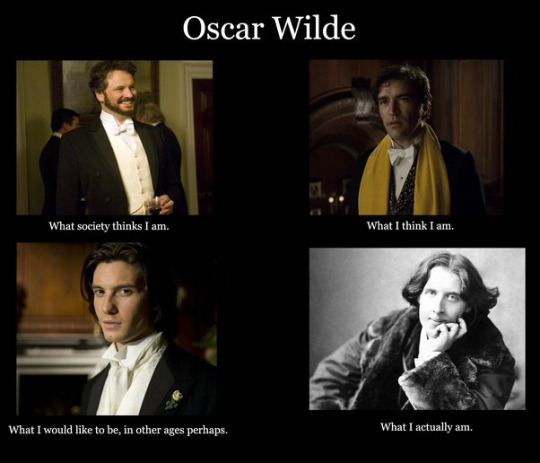
(I am way too proud of this outdated meme.)
So, all three of Dorian Gray’s main characters are meant to represent the author himself from various perspectives. Basil, the innocent and lovelorn painter, is how Wilde perceives himself. Lord Henry is how society perceives Wilde; he smoothly makes controversial philosophical statements about hedonism and beauty and whatnot, but doesn’t actually believe most of what he’s saying. And what a cryptic thing to say about Dorian, the naive-boy-turned-corrupt libertine. I guess I could interpret that as Wilde saying that he’d theoretically like to have the sheer daring and shamelessness needed to actually live out all of Henry’s philosophies. So… if that’s the case, then that puts a big question mark over Dorian’s entire character. If the message of the book is “hedonism is bad,” then why would Wilde want to be Dorian, even hypothetically? Dorian’s depravity is clearly a bad thing, right? Why would Wilde write him that way, then?
Because the book’s moral isn’t about hedonism, it’s about art.
Wilde warns the reader, “All art is at once surface and symbol. Those who go beneath the surface do so at their peril. Those who read the symbol do so at their peril.” But… that’s exactly what I plan to do. Sorry, Oscar.
So, let’s actually talk about the story now.
The Picture of Dorian Gray is a weirdly paradoxical work for the reasons I just spelled out — it seems like it should be condemning hedonism, but it doesn’t quite. It seems like it is a story about a man whose life steadily ruined by pleasure-seeking at the expense of all else, and yet… it’s just so decadent, this book. It’s full of philosophy about hedonism and the nature of good and evil, and it’s hard to tell just how much is espoused by its author and how much is condemned. Often the philosophy comes through Lord Henry, but sometimes it’s just there in the narration. And I love this book for that reason. I love thinking about stuff like that, so much. I love that this book practically smells like opium and tastes like rich chocolate.
The reason why I’m so interested in Wilde’s relationship to his own work here is because I agree with a lot of the philosophy presented in it. I know that Dorian Gray is being corrupted by Lord Henry’s influence, and I can see how that happens. But… still. This book is interesting to me because it seems to simultaneously espouse and decry the philosophy presented in it, which is why I think it’s a critique. “Let’s let this philosophy play a bit, and see what it does.” What if someone really did live the kind of life that Wilde himself was accused of living? When is hedonism healthy, and when is it not? Where are the limits?
Henry is Wilde’s caricature of himself. A lot of readers hate him for just how infuriating he is. All Lord Henry really does is spout controversial and kind of offensive statements. I’m sure we all know at least one person like that on the internet. Henry’s like the super intellectual version of a troll; he just says stuff to make people deeply uncomfortable and see how they’ll react. But he’s also persuasive — he’s a Mephistophelian character with a “low, musical” voice. He views Dorian almost like a science experiment. He admits that influence is evil, but then actively goes after an impressionable and naive boy to turn him into… well, whatever that portrait looked like in the last chapter. In chapter 2, he makes a long speech about how a man should “live out his life fully and completely […] give form to every feeling, expression to every thought, reality to every dream.” In short, screw Victorian morality. Life is to be experienced, so drink deeply of all it has to offer instead of wasting it constraining yourself. His best line, in my opinion, is:
The only way to get rid of a temptation is to yield to it. Resist it, and your soul grows sick with longing for the things it has forbidden to itself, with desire for what its monstrous laws have made monstrous and unlawful.
—Chapter 2
I kind of agree with this. Kind of. I do think that temptation is impossible to resist. The more you attempt to repress your desires, the more intensely you feel those desires. The best thing to do to avoid being tempted by genuinely dangerous things is to either satisfy the temptation using some safer outlet (or otherwise redirect it), or to avoid potential temptations altogether. The second line of this quote makes it clear that what Henry is really saying here is, “don’t let society’s stupid restrictions keep you from living your best life.”
And… yeah. If society shames you for being gay, whip out the rainbow colors! A lot of things (especially “sexual deviancy”) are only “temptations” because society and culture says that they’re wrong, not because they’re actually morally wrong. That’s an important distinction. We’ll get back to that. I believe that the difference between a temptation and a desire is that you can only be tempted by something dangerous and forbidden. If feeling lust as a young woman or man is considered morally wrong, then sex is a “temptation” — as soon as it’s considered a normal part of existing as a human, then it’s suddenly not a “temptation,” it’s just desire, and is a lot easier to deal with. You can find a safe outlet for it without feeling any shame, and without making any dumb mistakes out of sheer desperation.
Another thing Harry says is,
The aim of life is self-development. To realize one’s nature perfectly — that is what each of us is here for.
—Chapter 2
Yes! I have no argument here. None at all. However, reading between the lines, it seems as though Harry’s definition of “realizing one’s nature perfectly” is just experiencing everything in life and living it to its fullest, literally without distinguishing between good and bad experiences, or good and evil deeds. “Every experience is of value,” he says at one point. I don’t define self-development this way. My definition is complete self-awareness. If you’re self-aware, then you can be as self-indulgent as you want because you know where your limits are. Drinking at a party is fine, but you have to know your alcohol tolerance.
Dorian buys into this philosophy pretty hard. By chapter 11, his whole life has become one of pleasure, and… I’m still not disagreeing with a lot of the philosophy put forth by this novel:
The worship of the senses has often, and with much justice, been decried, men feeling a natural instinct of terror about passions and sensations that seem stranger than themselves […] But it appeared to Dorian Gray that the true nature of the senses had never been understood, and that they had remained savage and animal merely because the world had sought to starve them into submission or to kill them by pain, instead of aiming at making them elements of a new spirituality, of which a fine instinct for beauty was to be the dominant characteristic.
—Chapter 11
This is why I love this novel. I agree with this too. I have a fine instinct for beauty myself. Here, Dorian considers that maybe people in his society consider sensuality to be animalistic and savage only because they haven’t engaged with it at all, so it appears strange and dangerous. I also think that sensuality has been unfairly demonized for far too long, sometimes to the point where enjoying anything is sinful. I think it’s important to confront one’s passions (i.e. desires and emotions) and find a way to deal with them that’s both safe and satisfying. Like Dorian, I don’t have much patience for asceticism, or at least for the notion that it’s the most moral and spiritual way to live one’s life. Dorian attends church sometimes just out of curiosity, just becuase he finds it enjoyable or interesting, and he jumps around between different spiritualities the same way he collects jewels, textiles, and perfume:
But he [Dorian] never fell into the error of arresting his intellectual development by any formal acceptance of creed or system […] no theory of life seemed to him to be of any importance compared with life itself. […] He knew that the senses, no less than the soul, have their spiritual mysteries to reveal.
—Chapter 11
I feel called out by this. This concept of jumping around between different belief systems, using belief as a tool… that’s basically Chaos Magic in a nutshell. “Nothing is true, everything is permitted” definitely sounds like something Lord Henry would say. And I certainly don’t think that sensuality and spirituality are mutually exclusive, in fact, I think that the former can be a means of experiencing the latter. I worship Dionysus, for crying out loud. Often, the answer I give when someone on the internet asks me why I believe in magic or gods or anything else without evidence is “it’s fun,” i.e. pleasure.
And yet… my life could not be more different from Dorian’s. Perhaps the darkest part of my mind is something like Dorian, but in real life, I look like a stereotypical Victorian ingenue who’s always the first to die in a gothic novel like this one, and I’m quite pure and unsullied. I don’t do anything but sit in my dorm room and write on the internet all day. At parties, I freeze up and don’t speak to anyone. I’m still not much of a drinker, despite having been legally allowed to drink for several years now. My only real vice is sugar. I have no love life or sex life. I value pleasure becuase I can’t enjoy myself for the life of me, because I worry about everything all the time and waste energy on it. I’m not Dorian, and that’s probably why I can get away with hedonism.
Here’s the thing about our protagonist: he takes Harry much more seriously than he should. Harry doesn’t actually believe what he’s saying. He just says stuff, to be controversial and shocking. That’s what he does. But Dorian buys it, hard. Harry’s waxing lyrical about how there’s nothing in the world but youth and Dorian has the whole world at his fingertips because he’s pretty, makes Dorian obsessively concerned with his appearance. He barters his soul on a whim. And, then he proceeds to live the kind of lifestyle that Harry advocates for but doesn’t have the balls to actually commit to. Dorian is beautiful, rich, and able to do whatever he likes, which he often does. He has it all, but the truth is, he’s not really getting anything out of any experience. He goes through life like a passive spectator. This is probably because of the hedonism paradox, but it could also be because Dorian uses hedonism and collecting beautiful things as a means of escapism:
For these treasures, and everything that he collected in his lovely house, were to be to him a means of forgetfulness, modes by which he could escape, for a season, from the fear that seemed to him at times to be almost too great to bear.
— Chapter 11
Congratulations, Dorian, you ruined it for yourself.
I like beautiful things. I have more resin statues than I have space for. I have more perfumes than I actually wear. I spend a lot of my free time scrolling through artwork on Pinterest. I genuinely like museums and ballets and operas. I like dressing up in fancy Goth outfits even without an occasion. I like soft blankets. I like neoclassical music. I like decorating for holidays and making elaborate table displays and giving everything a distinctive theme. I deeply appreciate beauty. I don’t think it poisons me. I collect all these things because they make me happy, and that’s all. I think that happiness or pleasure is a worthy goal for its own sake.
But it has to be for its own sake, not for the sake of avoiding your problems, or to ignore the feeling of your sins crawling on your back. It’s like the difference between having a few drinks at a party for the fun of it, and becoming an alcoholic because you can’t come to terms with your psychological issues. Collect beautiful things because they make you happy, not because you hope they might fill the gaping void in your soul left behind by a portrait. Dorian definitely isn’t happy:
I have never searched for happiness. Who wants happiness? I have searched for pleasure.
—Chapter 18
Dorian’s whole life has been what I call “empty pleasure,” pleasure that is ultimately unfulfilling because it’s covering up a problem instead of being enjoyed for its own sake. If you indulge for the sake of avoiding something, you’re not enjoying the thing for what it is, you’re just desperately trying to take your mind off the thing you want to avoid nagging at the back of your brain, and the result is that you can’t really enjoy anything. Another example is gorging yourself on a delicious feast because it’s delicious, as opposed to binge eating. Or having sex with several people that you feel genuine affection for, as opposed to people you can’t even remember the names of. “Empty pleasure” is bad for the soul, but pleasure itself is not. The threat of “empty pleasure” is what has caused pleasure itself to be demonized for so long. It’s not the pleasure that’s bad, it’s the avoidance. Pleasure can’t be spiritual at all if its so superficial. Dorian’s hedonism is hollow and meaningless, so it corrupts his soul.
Confront your damn problems, don’t lock them in your attic! Once you’ve done that, you can really get the most out of life.
Thank you for allowing me all of that gratuitous philosophizing. Where was I? Oh, right — this book is a warning about art. Right.
Lord Henry’s last real contribution to Dorian’s corruption is giving him the mysterious “yellow book.” The “yellow book” is often speculated to be À rebours by Joris-Karl Huysmans. The book itself doesn’t really matter; what matters is the effect that it has on Dorian in-universe. It cements his hedonistic philosophy that had already been implanted by Lord Henry, and it seems to really drive him over the edge.
Dorian Gray had been poisoned by a book. There were moments when he looked on evil simply as a mode through which he could realize his conception of beauty.
— Chapter 11
So, there is no good and evil, only beauty. Dorian doesn’t really have a concept of good and evil anymore, just experiences in life, just whether things are beautiful or not. This is another pretty big problem with Dorian’s approach towards hedonism — he has no moral compass.
This idea that the book is “poisonous” seems to directly contradict the point that Wilde makes in the preface. “There is no such thing as a moral or immoral book. Books are well written, or badly written. That is all.” Why the contradiction? Dorian has made the mistake of taking art too seriously. The yellow book is “poisonous” not because of anything about the book itself, but because of how Dorian responds to it — because he takes it too seriously. The book wouldn’t be immoral if he just enjoyed it at face-value and didn’t take it to heart, would it? The fact that he becomes so obsessed with it is another nail in his coffin.
The first nail in the coffin comes much earlier. The scene where Dorian dumps Sibyl is critical. First, there’s Sibyl’s explanation of her perspective on her art:
The painted scenes were my world. I knew nothing but shadows, and I thought them real. You came — oh, by beautiful love! — and you freed my soul from prison. You taught me what reality really is. The stillness of the empty pageant in which I had always played. […] You had brought me something higher, something of which all art is but a reflection. You had made me understand what love really is. My love! My love! Prince Charming! Prince of life! I have grown sick of shadows. You are more to me than all art can ever be.
— Chapter 7
Until she met Dorian, Sibyl had been living through her plays. She quite literally “became” Juliet or Ophelia or whoever she was playing inside her mind, completely suspending her disbelief, because she just didn’t have much of a life outside of her acting. This made her a phenomenal actress, because watching an actor who’s that immersed in their role is also immersive for the audience. But when she met Dorian, life suddenly became more real to her and more meaningful to her than art. Sibyl completely lost that suspension of disbelief, and her acting skills along with it.
Dorian dumps her for saying so, in the most brutal way possible:
…you have killed my love. You used to stir my imagination, Now you don’t even stir my curiosity. You simply produce no effect. I loved you because you were marvellous, because you had genius and intellect, because you realized the dreams of great poets and gave shape and substance to the shadows of art. You have thrown it all away. You are shallow and stupid. My God! how mad I was to love you! What a fool I have been! You mean nothing to me now. I will never see you again. I will never think of you. […] Without your art, you are nothing. […] A third-rate actress with a pretty face.
Okay, there’s a lot to unpack here. Both Sibyl and Dorian have made the fatal mistake of taking art too seriously. On Sybil’s end, she’s been living through her art in a way that’s unhealthy. She doesn’t have a life or an identity beyond the persona that she adopts on stage. It’s like if your entire life was online, and the only people you’ve ever been in love with are fictional characters, and you didn’t have any life to speak of beyond that — oh. Okay, well, at least I have a sense of myself. Sibyl doesn’t have an identity of her own, so she borrows her identity from Shakespeare characters. Dorian, meanwhile, has fallen in love with this false identity. He doesn’t actually care about the person Sibyl actually is, because there’s nothing really there. When Sibyl feels like she’s finally found herself and become a person, Dorian is disgusted with her because she can no longer act, and she’s no longer interesting to him. Sibyl became an art piece and Dorian loved that art piece, not the person beneath.
This scene is so often misrepresented in adaptations. In most adaptations, the breakup is Harry’s fault, usually through giving him bad romance advice and teaching him to devalue women. For example, in the 2009 adaptation, Harry tempts Dorian to go to a brothel instead of seeing Sibyl perform, and Sibyl is concerned that she’s just another whore to Dorian. That becomes the focus of their breakup. Blaming the breakup on Harry makes it about hedonism; Sibyl feeling like Dorian is exploiting her for sex makes it about hedonism. It’s not about hedonism, it’s about art, which relates back to the preface. In the book, the breakup is entirely Dorian’s fault. It’s also the first time we see any real cruelty out of Dorian, which is then reflected by the portrait. Because this has nothing to do with Harry’s influence, I consider it proof that Dorian was never really that good of a person to begin with. He completely lacks empathy for Sibyl.
This is what results in tragedy. Sibyl commits suicide because she’s the pretty and innocent blond ingenue who’s always the first to die in a gothic novel, and Dorian officially begins his downward slide. Sibyl’s death is absolutely Dorian’s fault in every way. He doesn’t dive headfirst into hedonism until after that happens, and his hedonism is “empty” because he’s trying to numb the pain of Sibyl’s death. And it’s all downhill from there.
When Basil finally comes to see Dorian again, he’s appalled by Dorian’s reputation. Apparently, everything Dorian touches rots from the inside, so to speak. Sibyl becomes the first of many. Every person he’s involved with ends up too ashamed to show themselves in public, if they don’t commit suicide.
“…you were a man whom no pure-minded girl should be allowed to know, and whom no chaste woman should sit in the same room with. […] Why is your friendship so fatal to young men?” [Basil proceeds to describe several men whom Dorian was “inseparable” with who then ended up with disgraced reputations.] They say that you corrupt everyone with whom you become intimate.”
— Chapter 12
Dorian’s reputation is so sordid that all of the young women and men who become intimate with Dorian (interesting word choice) all end up ruined in some way or another. The same is said of Alan Campbell, the young chemist Dorian blackmails into deposing of Basil’s body. Apparently, they were “almost inseparable, indeed. Then the intimacy had come suddenly to an end.” Do I really need to spell this out? What does Dorian blackmail Allan with? We don’t know. It’s never said. But it’s heavily implied to be something about the very gay stuff that they almost definitely did together.
But — and this is one of the things that made the book so scandalous for its time — Dorian isn’t depraved because he’s bi. He’s just a bad person, and all of the poor young people who become involved with him suffer for it. Other characters in the story who are implied to be queer are not depicted as being evil. Basil, the most unambiguously gay character in the novel, is also one of the most innocent and the most undeserving of Dorian’s cruelty. Alan, too, is an innocent victim of Dorian, whatever he and Dorian might have done together in the past. During the scene in which Dorian blackmails Alan, his behavior implies that he is abusive as a partner, even outside the extraordinary circumstance of covering up a murder. Specifically, the “you made me do this” lines that he keeps throwing at Alan:
I tried to spare you. You will do me the justice to admit that. You were stern, harsh, offensive. You treated me as no man has ever dared to treat me—no living man, at any rate. I bore it all. Now it is for me to dictate terms.
— Chapter 14
How many other people has Dorian treated like this? How many of his lovers has he gaslit into believing that his abuse is their fault? How many people has he threatened with social ruin if they don’t do what he wants? (His own reputation can’t get any worse, after all.) He gives Alan a “look of pity,” as if to say, “this will hurt you way more than it hurts me.” Until the very end, Dorian seems completely oblivious (perhaps willingly so) to the effect that his actions have on other people, or worse, he actively enjoys it.
So, that brings me to Basil Hallward. Poor, poor Basil.
Basil knows his fatal flaw, and here we come back to taking art too seriously:
Dorian, from the moment I met you, your personality had the most extraordinary influence over me. I was dominated, soul, brain, and power, by you. You became to me the visible incarnation of that unseen ideal whose memory haunts us like an exquisite dream. I worshipped you. […] I was only happy when I was with you. When you were away from me, you were still present in my art…. […] One day, a fatal day I sometimes think, I determined to paint a wonderful portrait of you as you actually are, not in the costume of dead ages, but in your own dress and your own time. […] …I know that as I worked on it, every flake and film of colour seemed to me to reveal my secret. I grew afraid that others would know of my idolatry. I felt, Dorian, that I had told too much, that I had put too much of myself into it. […] Well, after a few days the thing left my studio, and as soon as I had gotten rid of the intolerable fascination of its presence, it seemed to me that I had been foolish in imagining that I had seen anything in it, more than that you were extremely good-looking and that I could paint. Even now I cannot help feeling that it is a mistake to think that the passion one feels in creation is ever really shown in the work that one creates. Art is always more abstract than we fancy. Form and colour tell us of form and colour — that is all. It often seems to me that art conceals the artist far more than it reveals him.
— Chapter 9
This is all one paragraph, by the way, and the whole thing spans an entire page. It is probably the gayest paragraph of the entire body of Victorian literature. Basil is clearly infatuated. He becomes so obsessed with Dorian that it’s almost unhealthy. This anguished declaration of love obviously echoes the preface, which is to be expected if Wilde sees Basil as a representation of himself. “To reveal art and conceal the artist is art’s aim.” Basil is afraid that the portrait doesn’t reveal Dorian as he is, instead revealing Basil’s salacious crush on Dorian. But he ultimately comes to the same conclusion as the preface — that art conceals the artist and simply exists for its own sake. Anyone is able to project onto art and see anything they want in it, but art simply is what it is, and taking it too seriously results in peril. Perhaps the true tragic figure of this book isn’t Dorian, it’s Basil, for having invested so much in this portrait. He doesn’t paint it for the sake of creating a beautiful thing, but for the sake of glorifying his crush. He treated Dorian like a god, and could not see past his projection of perfection to see that Dorian was becoming a monster until it was much too late. When Basil sees what has become of the portrait, he acknowledges that this is the only thing anyone is punished for in this novel: “I worshipped you too much. I am punished for it. You worshipped yourself too much. We are both punished.”
Dorian himself kind of becomes an art piece. He literally switches places with the portrait. The portrait shows the corruption of Dorian’s soul, and Dorian himself becomes a projection of both Harry “poisonous” philosophy and Basil’s unhealthy projection. He is admired intensely. He exists just to be beautiful, like an art piece, and no one can really see past his beauty. The novel’s premise is based around the idea that people’s sins are written across their face, and that beauty equals goodness. No one can believe anything bad about Dorian when they see him because he just looks so innocent and angelic. Before he learns the truth, Basil is disturbed by Dorian’s reputation but just can’t believe it: “But you, Dorian, with your pure, bright, innocent face, and your marvellous untroubled youth—I can’t believe anything against you.” Similar comments are made by other characters. Dorian is just too pretty to be as evil as he is. The subversiveness of the book comes from that premise. How often are beautiful people able to get away with anything in society, just because people tend to assume they’re innocent? It’s no wonder that Dorian is completely narcissistic.
Even Harry is incredulous when Dorian all but admits to having murdered Basil, thinking that he’s not capable of murder: “Crime belongs exclusively to the lower orders […] I should fancy that crime was to them what art is to us, simply a method of procuring extraordinary sensations.” Comparing crime to art is really interesting, to say the least. Most people would say that there’s nothing artistic about crime, but Harry isn’t most people, he’s a troll. And the only reason he gets off scot-free in this book is because he never commits the sin of taking art too seriously! Apparently, according to him, Dorian cannot commit a crime because he’s basically an art piece, and he just doesn’t have any need to kill someone. There’s another comment that Harry makes towards the end that suggests that he views Dorian as an art piece:
I am so glad that you have never done anything, never carved a statue, or painted a picture, or produced anything outside of yourself! Life has been your art. You have set yourself to music. Your days are your sonnets.
—Chapter 19
This echoes an earlier comment that he made about Basil being boring because everything that’s interesting about him, he puts into his art. Dorian’s life is vibrant because he directs all that same creative energy into living instead of into an art piece. Dorian himself is an art piece. And yet, while Harry is saying this, Dorian is feeling Basil’s murder weighing upon him.
The title refers not to Dorian himself, but to the portrait — a piece of art. The portrait drives the story, and even Dorian himself realizes this. Dorian’s undoing is that he can’t live with the guilt of his reckless murder and probably all his other sins, especially when he has a literal conscience staring back at him. He would have gotten away with murder just for being pretty, if he didn’t have a conscience. It’s far too late for him to redeem himself, so he decides to destroy the conscience. And… we know how that turns out.
The true “moral” of this book is really hard to parse out, which is maybe why we shouldn’t attempt to read the symbol and just take the whole book at face-value, right? There’s a lot going on here. There’s the inability to face up to one’s problems and deal with them in a way that’s healthy, resulting in any form of enjoyment being “empty.” There’s the idolization of beauty, always assuming the best of beautiful people even when they’re really quite awful. And there’s art — treating art like life or life like art is always going to come back to bite you in the end. That would make this a cautionary tale about what happens when art isn’t appreciated for its own sake, and is projected on so much that one confuses it with life, or sought as a source of morality. Art is not moral, it just is — reading (or writing!) a book from the perspective of a serial killer will not make you a bad person. This book is not a bad influence, it just is.
Even after having written all of that, I’m still not really sure what Wilde was trying to say about hedonism, so let’s ask him. According to Wilde himself, the moral of The Picture of Dorian Gray is, “All excess, as well as all renunciation, brings its own punishment.”
Both extremes are bad. Indulge in life, but make sure you do so with empathy, and for the right reasons! Find some middle ground. And most of all, don’t be afraid of your own portrait.
#dorian gray#the picture of dorian gray#dorian gray weekly#oscar wilde#literary analysis#gothic literature#gothic lit#art#hedonism#tpodg
134 notes
·
View notes
Text

is elysia a lesbian: discuss
This is actually (genuinely, sincerely) something I really really really love to talk about. For those of you who aren't familiar, allow me to show you some Real and Canon words out of Miss Pink Elf's mouth:

And that is... not at all it LOL.
I would like to start this conversation, however, with an acknowledgment. Whether the intention on Hoyoverse's end is representation or fanservice, Hi3 has undoubtedly secured itself as a yuriful piece of media. Elysia aside, it boasts a number of very canon wlw ships, and holds a lot of importance to many of its community members that identify as such. It meant a lot to me in my youth for similar reasons, and for all casual purposes: yes, Elysia likes girls. I think I would have to turn in my writing license if I disagreed.
However this is an RP group, and so "casual purposes" don't entirely cut it. Love is something so deeply ingrained into this character that the discussion of romance/sexuality just isn't enough. I think one of the biggest pieces to understanding Elysia is to understand, first, what love means to her.
It's quite well known that Elysia is not human. Her entire existence, despite being wholly dedicated to humanity, is not comparable to theirs. She has played human, has come as close as she possibly could to being one, but fundamentally she never has been. To comprehend what love means to her, first you have to separate it from the typical, human understanding of the term. Elysia does not love any one thing, she does not fall in love, she is love. An affection for a single person is not solely theirs, it is humanity's. You, a single person, are just as loved by her as any other.
Sorry. Feels like I'm back in bible school LMFAO.
Anyway. There is something so delightful to me about picking apart why Elysia takes up such a flirtatious nature. I boil it down to, rather simply, an imitation of what she has seen other humans equate to love. It's something she takes to so joyously, and so liberally, yet never reads as overbearing or weird or with too much intention.
It is genuinely hard for me to imagine Elysia in a Titled Relationship the way human society functions. She just... doesn't love like that. It's too small a thing to encompass the sheer gravity of all her affections. Desires for human affections and the like are just not something she could ever have a natural inclination for, because she isn't human. Anything Elysia pursues is intentional, stemming not from a natural interest but an artificial one spurred by her desire to be human.
Does that make sense? Maybe.
All of this is to say that the answer is Yes*(?). Elysia likes girls, she flirts with them, she certainly finds them pleasing to look at (think in the way that a person would enjoy looking at art, do you feel me) but she isn't. A Lesbian. Because she's not... anything. She's just too swag for human labels. Tho she is undeniably way less interested in men (if at all)
So I guess the jury's still kinda out LOL
#✧ ˖ 𝕏𝕀𝕀𝕀. musings. › … stars of the past .#happy pride month LMFAOOOOOO#if you read this. sorry. it's just me rambling with minimal reason#but i think it's such a crucial thing about her character#anyway#sorry. the voices won again#solstice time now that ive exorcised this demon
7 notes
·
View notes
Text
I want to thank @for-the-writing-artist for being willing to have the discussion we did, but I think they're right that we've pretty much reached a point where we've covered all we'll be able to. In their last post on the matter, they indicated that they're not particularly interested in providing reasons to believe what they believe and I'm unable to adopt any belief without sufficient reason.
I still don't have any good reason to believe that lying is necessarily wrong, or that what the Bible says about god or Jesus is true, or that the Bible ever makes an outright statement that slavery is immoral, or that any interpretation of what the Bible says about anything else is more convincing than any other conflicting interpretation, or that any ancient understanding of morality should be preferred over our modern understanding, and it all boils down to evidence.
We're too far apart on these points and a few others to really continue without retreading the same topics over and over, but it seemed like they wanted some response to their last few points (forgive me if I'm wrong, it's not my intention to push on a topic you're finished discussing), so I'll give some brief notes. (Looking over the post before publishing, I should reconsider my use of the word "brief" lol)
> I get that the burden of proof lies on me, and I would be genuinely interested in your reasons for why God isn't real. But a discussion can only go so far in unequal footing.
It's absolutely correct that the burden of proof is on the person making the positive claim, and that's why I avoid claiming that gods aren't real. My position is that I'm unconvinced by any claim I've ever heard that a god or some gods exist, so I really don't need any other reason to reject them. There may be a god or some gods but I lack any good evidence to support the idea that they exist. I will admit that I have a strong bias against these claims - along with claims about angels, demons, ghosts, goblins, spirits, souls, cryptids, alien abductions, a flat earth, etc. - but that's because the reality itself is biased against these claims, yielding no definitive evidence that any of these things are possible or extant. But I still have these conversations because I want to believe true things, and if someone knows some demonstrable truth that I'm not aware of, I'd like to know about it in order to form a more accurate view of reality.
> And, if by some miracle, it is proven without a shadow of doubt that God is real, and all your answers and reasons for disbelief disproved ─ would you acquiesce? Would you believe then?
I've touched on this recently, but maybe it was with one of the other folks who joined this conversation. Briefly, my skepticism requires that I adapt my worldview to new information when it comes to my awareness. So if a god is demonstrated to exist, then I've no reason to still be atheist, but whether I actually worship or respect that deity depends entirely on whether certain claims about its past actions and moral standards are true as well. In the case of Yahweh, I'd need to know for certain that a lot of things in the Bible are complete lies conceived by ancient manipulative leaders before I ever said "god is good."
> Something is. Something exists that is higher than me, or you. It could be this Krishna, it could be God. But I cannot argue in favor of this, if you believe that Nothing exists (really weird, as nothing is the absence of something). I would need to disprove this Nothing to then argue in favor of Something.
Assuming we're not brains in jars dreaming up all of reality, lots of things exist. We presuppose reality, but can't demonstrate our existence and that's an ancient and ongoing problem, so in order to function we have to take this axiom or be paralyzed by doubt. Depending on what you mean by "something higher" I might agree or disagree, but if you mean that it's necessarily something like a god I certainly don't think so. I can almost see what you're saying regarding something/nothing, but I'm not aware of any possibility that "nothing" has ever or could ever exist. Nothing, by existing, would necessarily become something. I only make this note because you began that point by saying "if you believe..." and I just want to make it clear that I don't believe in "nothing," but I reject claims of undetectable "somethings" where we lack any good indication that they should be there.
All in all, it was a good conversation and I appreciate the time and energy it took to give thoughtful responses to what I was saying. And I hope it goes without saying that although I think you're convinced of some bad ideas, I don't have any such evaluation of your character as a human. I hope you keep asking questions and being open to ideas you might disagree with.
#skepticism#religion#bible#faith#god#atheism#belief#ex christian#where's the evidence?#i'm still unconvinced
6 notes
·
View notes